Greg Mortimer Cruise Review
By Nicholas Kontis
While I never tire of cruising, some voyages are more memorable than others.
One such journey was a 10-night Central America cruise through the Panama Canal, from Costa Rica’s Pacific shore to historic Cartagena on Colombia’s Caribbean coast.
My wife and I traveled in April 2022 with Australia’s Aurora Expeditions aboard its 132-passenger Greg Mortimer expedition ship.
Before and after our canal transit, our Greg Mortimer cruise hugged the verdant jungle coastlines of Costa Rica and Panama en route to Colombia.
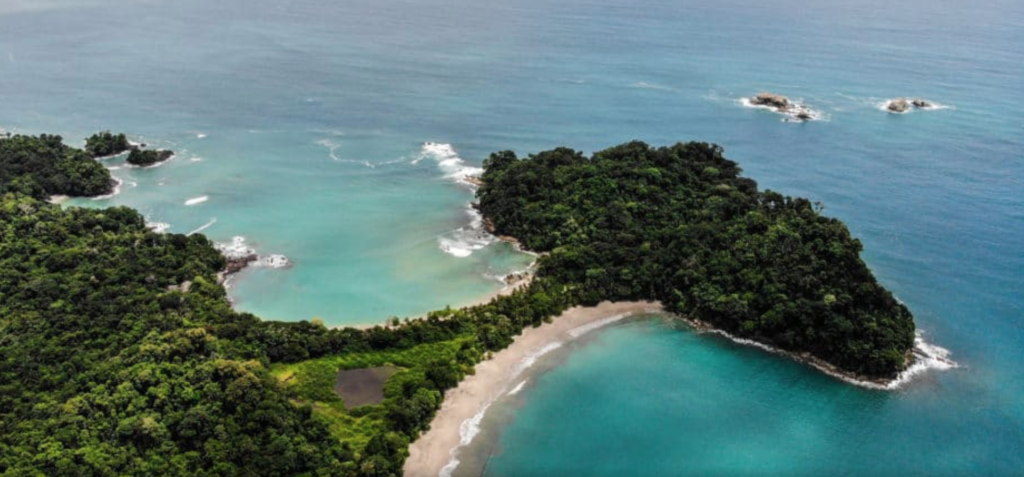
Playa Escondilla & Playa Manuel Antonio, Costa Rica. * Photo: Aurora Expeditions
Highlights of Our Greg Mortimer Cruise
- Luxury accommodation aboard Greg Mortimer
- Nature walks and active excursions to see the extraordinary flora and fauna on the Pacific coasts of Costa Rica and Panama
- Protected marine life in the sanctuary of Coiba National Park
- The indigenous community of Embera people in remote Darien National Park
- A tour of Panama’s “Old Town” with its striking multicolored buildings
- A daytime crossing of the Panama Canal
- The Afro-Caribbean vibe of Cartagena de Indias, Colombia
RELATED: Anne Kalosh reports on the debut of the Greg Mortimer in 2019.
RELATED: Anne Kalosh reports on Aurora going carbon neutral.
Subscribe to our monthly small ship cruise email
Subscribe to QuirkyCruise.com for monthly curated newsletters highlighting our top small cruise ship reviews, round-ups & offers!
The Greg Mortimer Story
Aurora Expeditions was the brainchild of Greg and Margaret Mortimer, intrepid explorers and mountaineers who launched the company in 1991 (after leading trips to Antarctica with another company) to share their passion with friends and family.
In Antarctica, they pioneered ship-based adventures in which cruise guests could enjoy sea kayaking, snorkeling, scuba diving or even climbing.
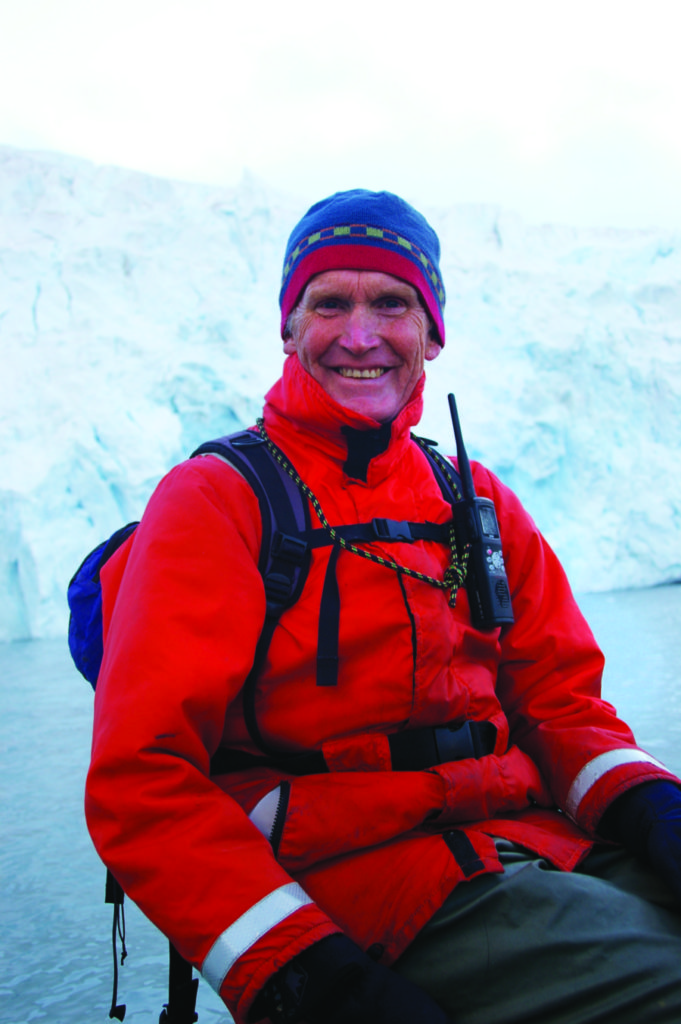
Greg Mortimer. * Photo: Aurora Expeditions
His namesake ship, the stately Greg Mortimer, was built in 2019 for the expressed purpose of traveling the waters of the Antarctic and Arctic regions.
State-of-the-art technology, notably a Norwegian-designed Ulstein X-Bow, helps the Greg Mortimer cruise as smoothly as possible through the waters of the Drake Passage and Greenland’s surrounding seas.
When we hit a storm between Panama and Cartagena, this feature definitely helped keep the ship more stable.
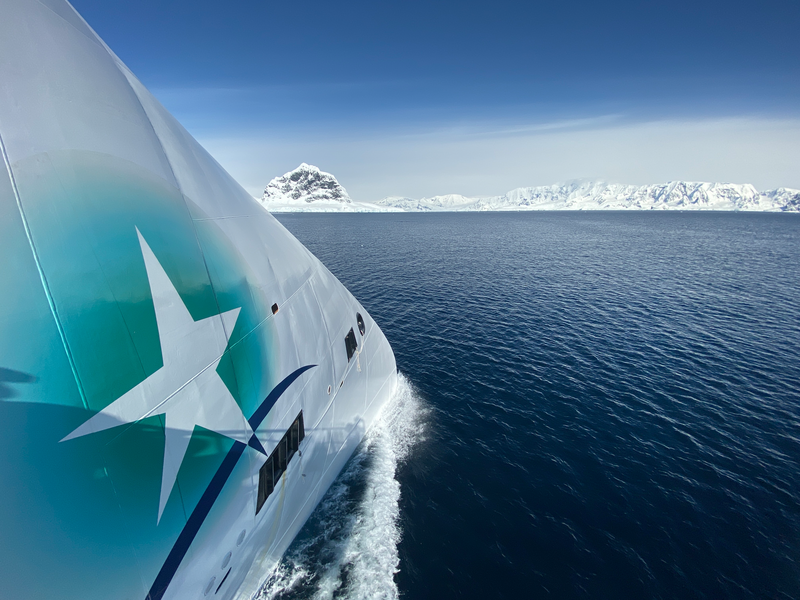
Here, a shot of Greg Mortimer's Norwegian-designed Ulstein X-Bow, in Antarctica. * Photo: Scott Portelli for Aurora Expeditions
While the ship was built to navigate the tough weather and icy, rough seas of both poles, in between seasons, the Greg Mortimer’s repositioning cruises spend some time in Costa Rica in the spring.
RELATED: Quirky's Ted explains the main differences between Arctic & Antarctica cruises.
RELATED: Ted tells us where the world's roughest seas are.
Our Greg Mortimer Cruise Itinerary — Cruising Along the Rich Coast
Costa Rica, whose name translates to “Rich Coast,” is one of the planet’s most biodiverse countries. Beaches along both the Pacific and Caribbean sides offer plenty of coastline for surfing and snorkeling.
Both Costa Rica and Panama, two of the seven countries that make up Central America, the strip of land that acts as a bridge between North and South America, brim with an abundance of wildlife in their national parks and reserves.
In fact, proud of its pura vida (“pure life” in Spanish), Costa Rica is home to 5% of the world’s species — even though it covers a mere .03% of the earth’s surface.
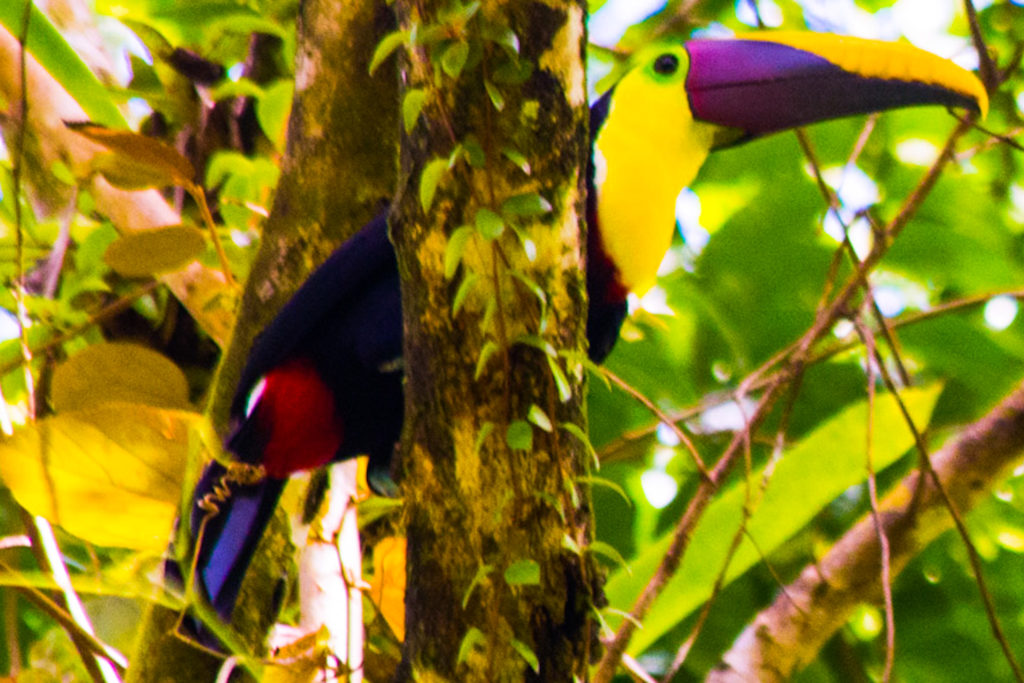
Toucans are one of my favorite birds and Costa Rica is a great place to see the elusive yellow-eared toucan. * Photo: Nick Kontis
Here's Our Greg Mortimer Cruise Itinerary to Costa Rica & Panama
The 10-night cruise was packaged with two hotel nights, one at the beginning and one at the end, for a total of 12 nights.
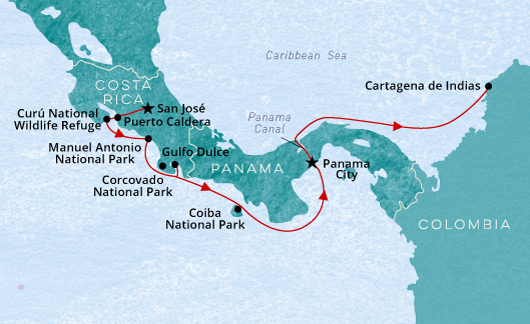
The 10-night Costa Rica & Panama Canal cruise route. * Image: Aurora Expeditions
April 18 — Check-in to Double Tree Hilton Cariari (included in fares)
April 19 — Bus ride to Punta Arenas, where we boarded the Greg Mortimer for 10 nights; afternoon landing at Turtle Island
April 20 — Manuel Antonio National Park, Costa Rica
April 21 — Corcovado National Park, Costa Rica
April 22 — Golfo Dulce, the Soladero village and Piedras Blancas National Park, Costa Rica
April 23 — Coiba National Marine Park, Panama
April 24 — Bartolome Island and the Pearl Islands, Panama
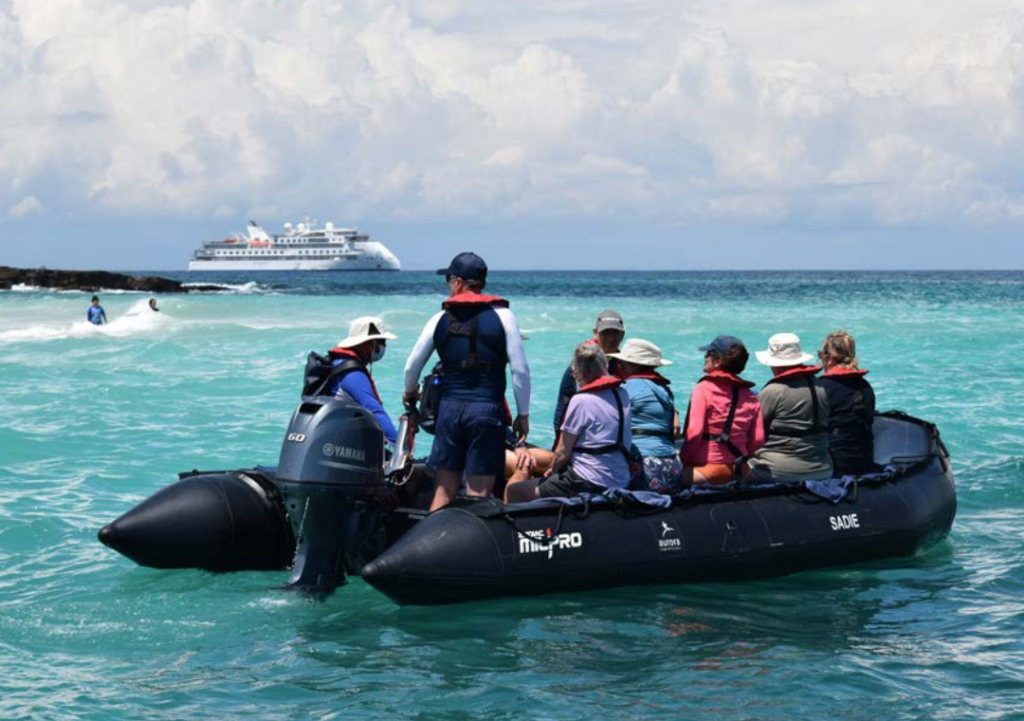
The Pearl Islands of Panama. * Photo: Aurora Expeditions
April 25 — Panama City — Ember Village Tour
April 26 — Panama City — Casco Viejo, Lake Gatun & Canal Museum
April 27 —Panama Canal, including the Miraflores Locks
April 28 — Caribbean Sea, first & only sea day
April 29 — Cartagena; disembark ship for a city tour
April 30— Hotel stay in Cartagena (included in fares)
Here's the activity log from our cruise, courtesy of Aurora Expeditions.
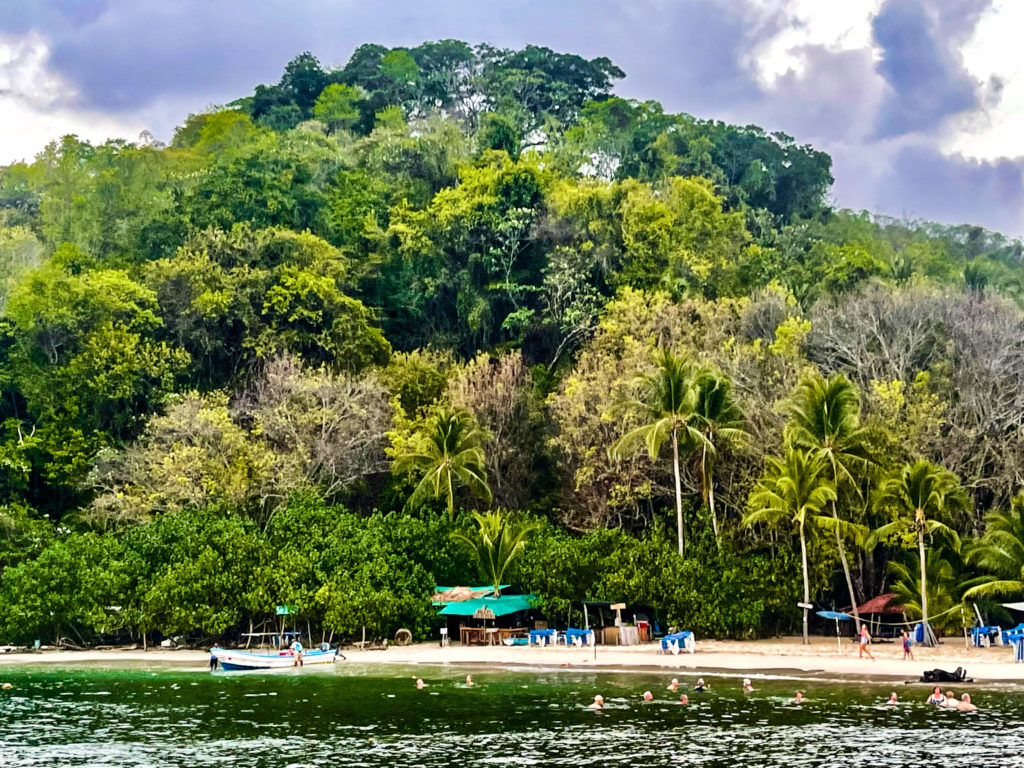
The lush jungle island of Isla Tortuga, or Turtle Island, was our first stop. * Photo: Nick Kontis
Pre-cruise nights in San José
Costa Rica’s capital city San José is a popular jumping-off point for travelers to embark on adventures to explore the country’s natural bounty, form its jungles to its waterfalls, beaches and mountains.
We like to arrive a day or two before sailing to acclimate to our surroundings and, in this case, to explore the colonial capital.
We stayed in San José’s Doubletree by Hilton Cariari for two nights before the cruise. One night is included in the cruise price fare.
Located outside of town, the Hilton Cariari cost us $149 USD for our extra night there. An Uber to downtown San José cost around $7.
The city itself is also worth a bit of time to check out.
Explore San José’s Mercado Central Market or the National Artisan Market, a shopper’s paradise. And San José’s main thoroughfare, Avenida Central, makes for an intriguing walk past parks, shopping areas, restaurants, painted mural and fountains.
Soon it was time to board the Greg Mortimer, which entailed a comfortable bus ride west from San José to Puerto Caldera.
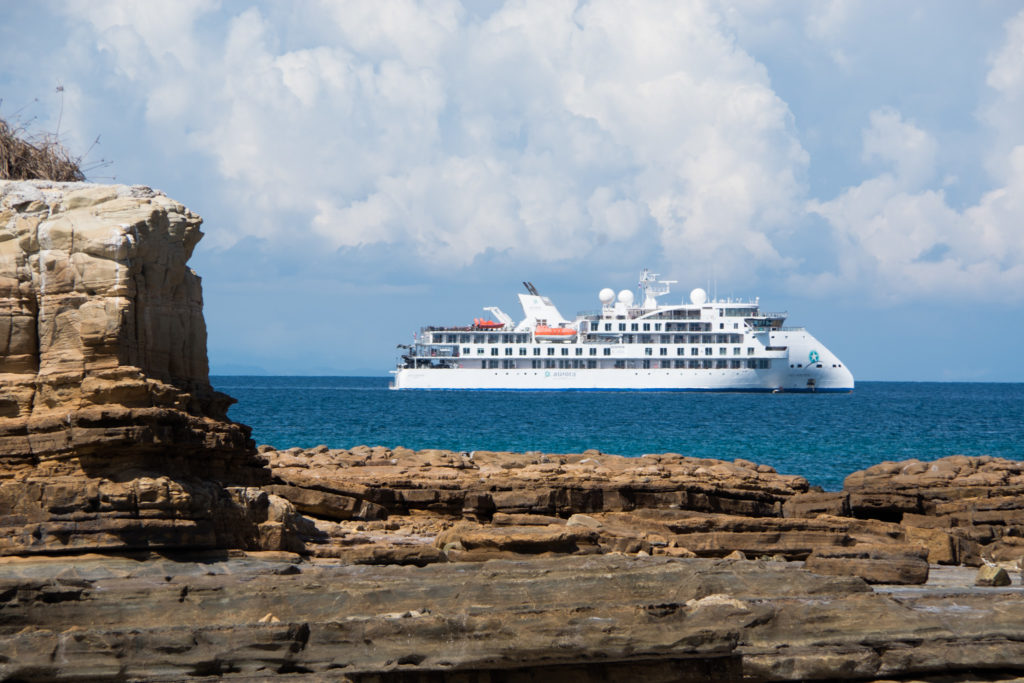
The new 160-pax Greg Mortimer. * Photo: Nick Kontis
First Impressions of our Greg Mortimer Cruise
Upon first boarding, as one might expect on a brand new expedition ship, the tasteful interior is subtle and soothing with beige and light brown earth tones on all decks.
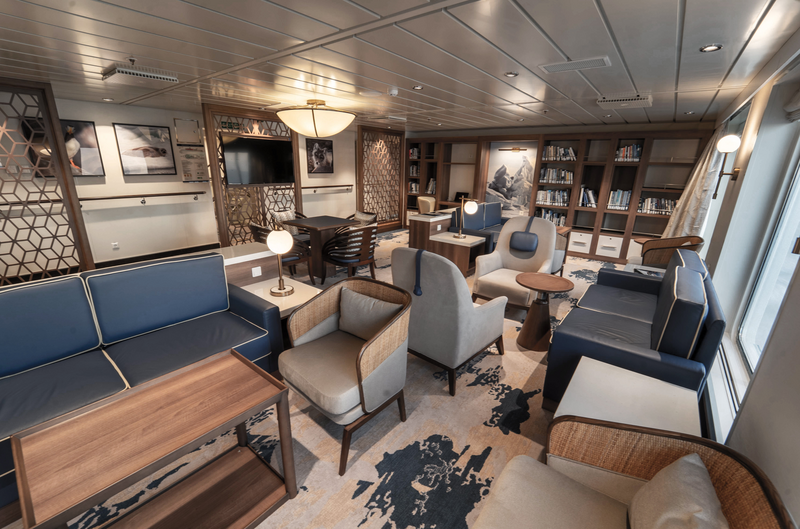
Soothing earth tones dominate Greg Mortimer's decor, like in the library. * Photo: Aurora Expeditions
The corridors of the boutique-like ship are lined with photographs of various polar explorations, including pictures of penguin colonies.
The Greg is comfy, not flashy, with plenty of room to find a quiet corner for yourself. Soft cream, taupe, tan, and hazel tones soften the common areas.
We felt safe knowing that if the Greg Mortimer could handle polar routes, it could navigate tropical storms in Central America as well.
At a length of 104 meters (341 feet), the vessel can accommodate up to 160 guests. (However, while the passenger max is 160, the average number of passengers on a typical sailing is 132, though there were a mere 32 on our spring 2022 cruise due to lingering concerns of traveling during the pandemic.)
The overall layout is easy to manage across six passenger decks, including two sun decks with a pool, pool bar and two hot tubs.
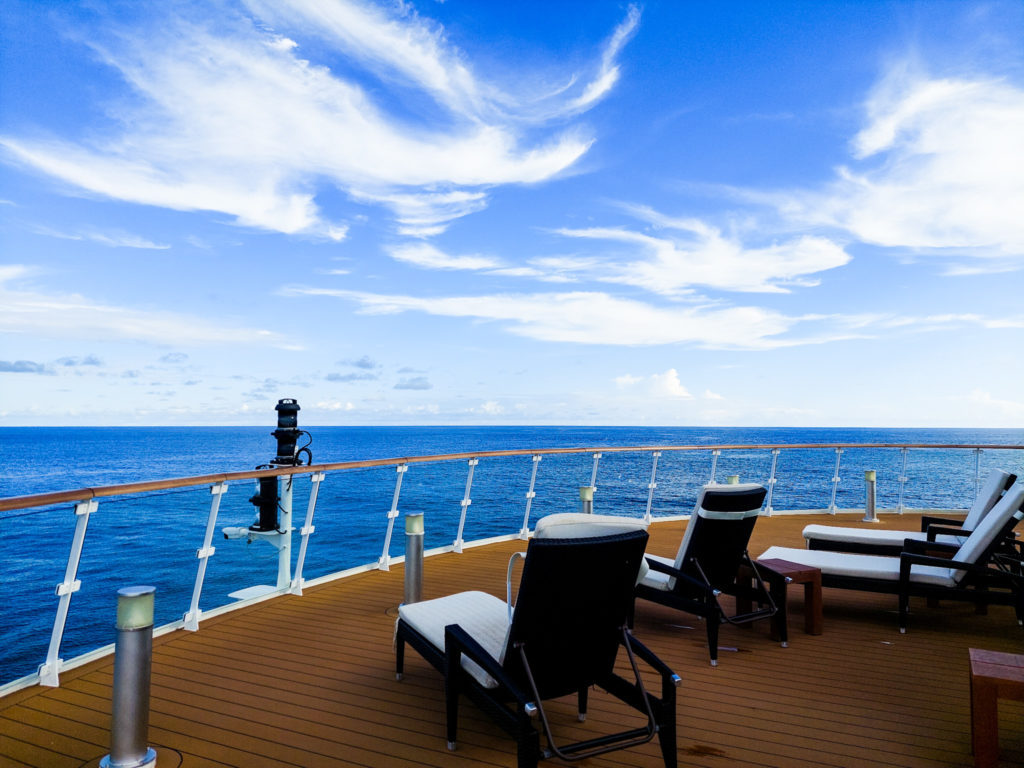
The outdoor decks of the Greg Mortimer. * Photo: Nick Kontis
A roomy library is filled with books about Antarctica, the Arctic, and some on Costa Rica and Panama.
We were briefed on each day’s activities in the spacious lecture theater by the onboard team of international expedition leaders, which included naturalists and biologists, as well as birding, snorkeling and kayak specialists. The room has large windows for soothing ambient lighting.
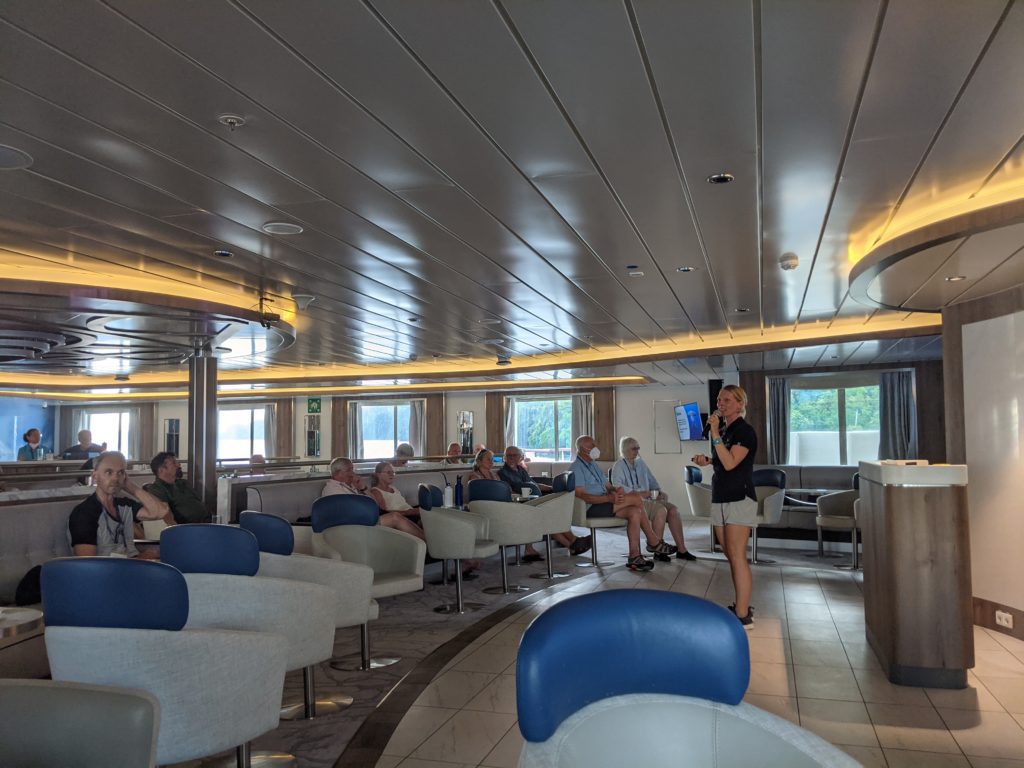
Each morning and evening there is a daily briefing of the day's events in the lecture lounge. * Photo: Nick Kontis
You'll spend at least two hours a day here with the expert guides discussing the day's events and learning about the local flora, fauna, people, and activities.
The lecture space opens to the ship's main deck, with the ample space doubling as a lounge area.
Now, perhaps the most important room is the mudroom, especially so on polar expeditions. And there are four convenient sea-level zodiac landing platforms for easy access to excursions (on my itinerary, that means to nearby rainforests and islands). Fifteen of the rubber craft are onboard to transport passengers ashore.
At the end of each day, we enjoyed drinks (not included) in the Elephant Bar and piano bar (wine and beer were complimentary only at dinner).
And we browsed the gift shop for Aurora-logo keepsakes as well as caps, sunscreen, wet bags, and toiletries.
Given the ship’s nonstop expedition schedule, I doubt many guests were able to take advantage of the gym or spa. I know I couldn’t find time for a massage or some time in the ocean-view sauna.
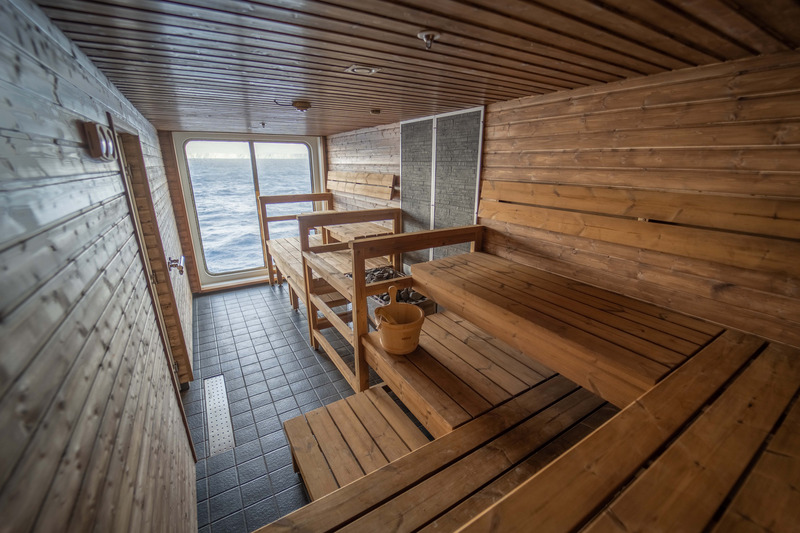
Greg Mortimer's ocean-view sauna. * Photo: Aurora Expeditions
While my wife and I remained healthy, as did the other guests and crew for the entire journey, but we were secure in knowing there was a medical facility on board, with a doctor and staff on call in the event of illness or accident.
Greg Mortimer’s Cabins
While the Greg Mortimer, first and foremost, is a polar expedition ship created for traversing the rough waters of Antarctica and the Arctic, it’s also a very comfortable and quietly stylish ship.
There are 76 oceanview staterooms in total, with most (about 85%) with balconies. We stayed in cabin #611, measuring about 175 square feet, with a 70-foot balcony.
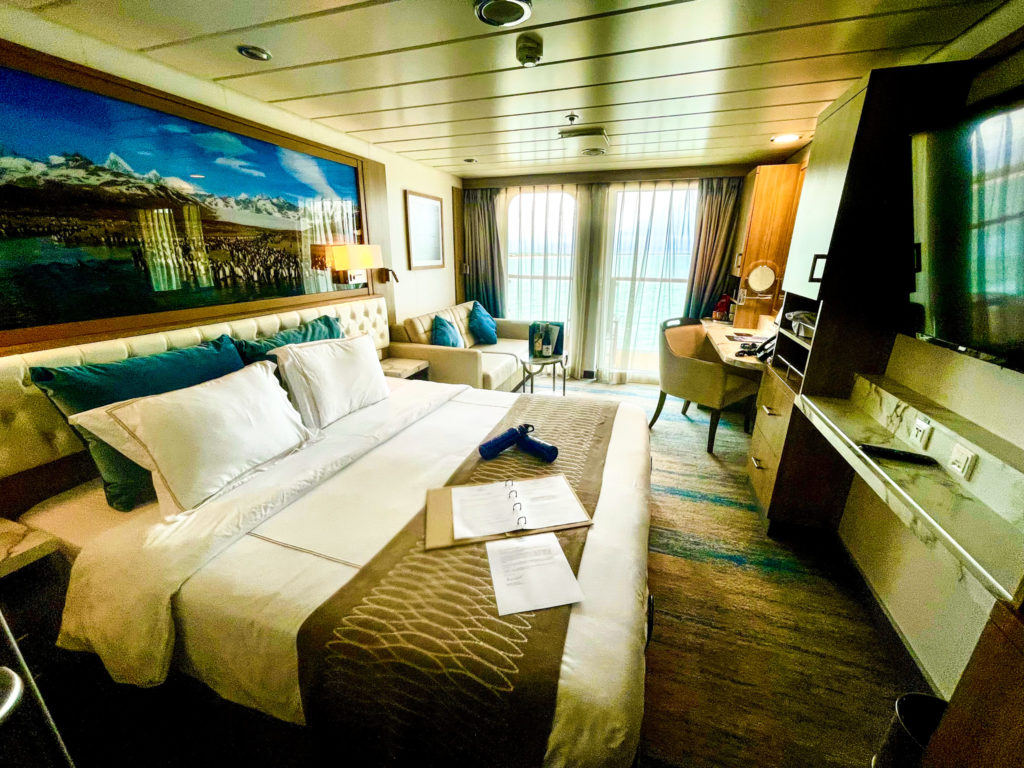
My spacious room, #611, came with king bed, sofa, desk and chair. * Photo: Gabriela Ramos
All the cabins feature sweeping rectangular photos behind the bed of various themes connected to Aurora’s destinations, like polar bears in Greenland or Antarctica. A waddle of penguins graced our quarters.
And, there was no need to clutter the room with expedition gear as each guest is assigned large open lockers in the mudroom on Deck 3 to house their life vests for zodiac expeditions, fins, boots, snorkel, and other equipment, which means more storage for personal items in your stateroom.
VIDEO: Below, Nick shows us his cabin, #611.
Learning about the Wildlife & Native Tribes of Costa Rica & Panama
Costa Rica and Panama are an ecological treasure trove of UNESCO World Heritage sites and national parks.
The first stop on our Greg Mortimer cruise was to explore the natural bounty of the Manuel Antonio National Park, Costa Rica’s most iconic nature reserve.
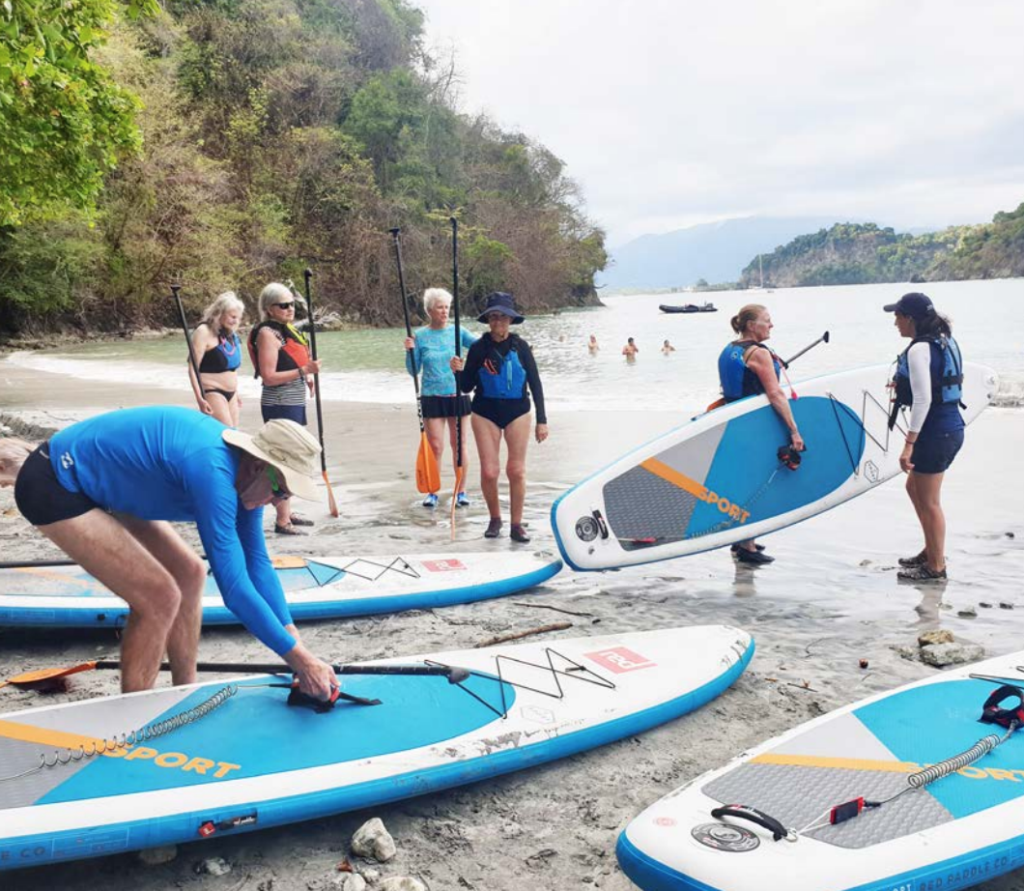
Paddleboarding in Manuel Antonio National Park. * Photo: Aurora Expeditions
Cruising Costa Rica’s Coast
In Costa Rica’s many impressive national parks, there are plenty of opportunities for wildlife watching.
While we were not the only ones in the parks, groups were separated on guided walks, and at every turn we were always close to flora and fauna.
Other highlights in Costa Rica included guided tours in the lush tropical rainforests of the Osa Peninsula and Corcovado National Park, where we were up close with sloths and cacophonous rainbow-billed toucans.
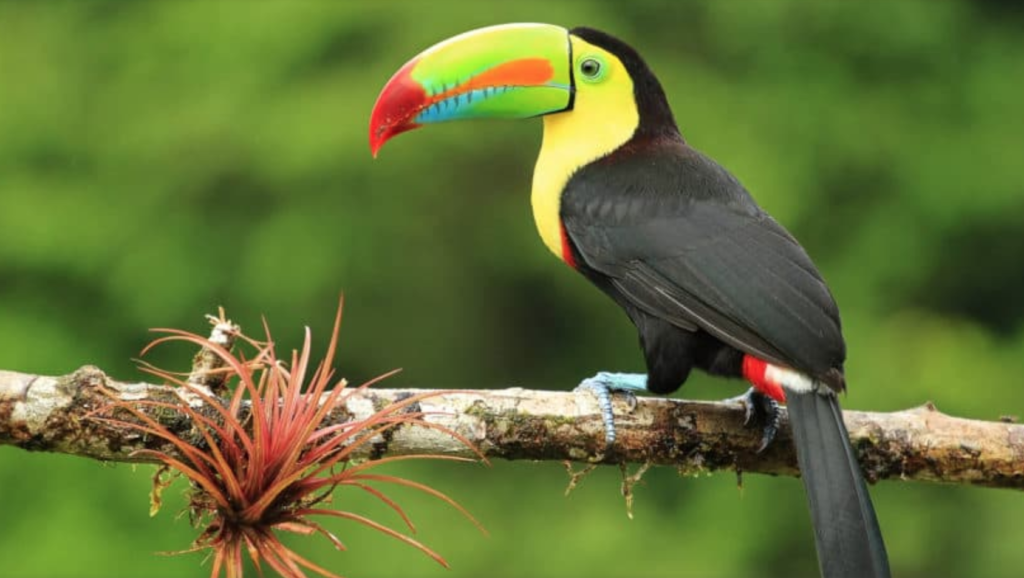
A gorgeous toucan in Costa Rica. * Photo: Aurora Expeditions
We stood in silence listening to the haunting guttural sounds of the four species of Costa Rica monkeys — spider monkeys, white-faced capuchin monkeys, howler monkeys, and squirrel monkeys.
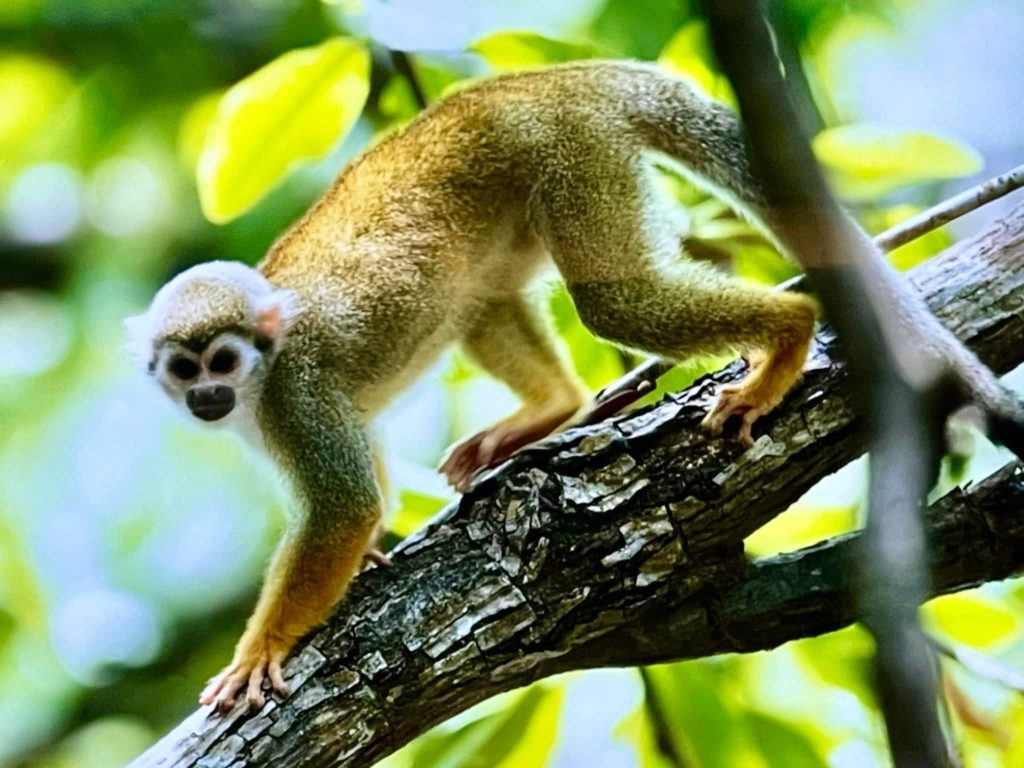
We were able to see Costa Rica's 4 different species of monkeys — Howler, White Face or Capuchin, Squirrel and Spider. * Photo: Nick Kontis
Most guests brought digital cameras with large zoom lenses on guided nature walks, which were split into two groups of 16 people.
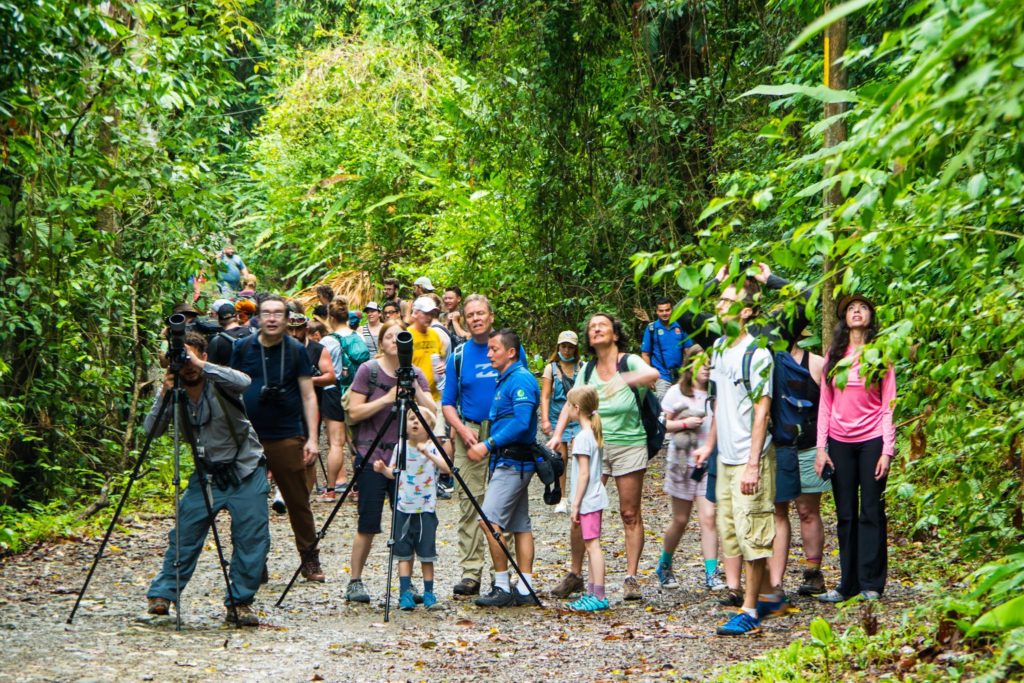
The zoom lenses were out in force. * Photo: Nick Kontis
Others brought binoculars (not provided by the ship) and used their iphones to view and photograph birds and monkeys high above in the jungle canopy.
We saw a good number of the 921 species of birds native to this ecologically-rich nation — including the chestnut-backed antbird, the blue-grey tanager, the great kiskadee, and Costa Rica’s national bird, the clay-colored thrush.
Meanwhile, encounters with blue morpho butterflies, green iguanas, and the white-nosed coatimundi accented our hikes. All of the birds and mammals of Costa Rica were in close proximity, and the photographers in our group captured eye-catching nature photos.
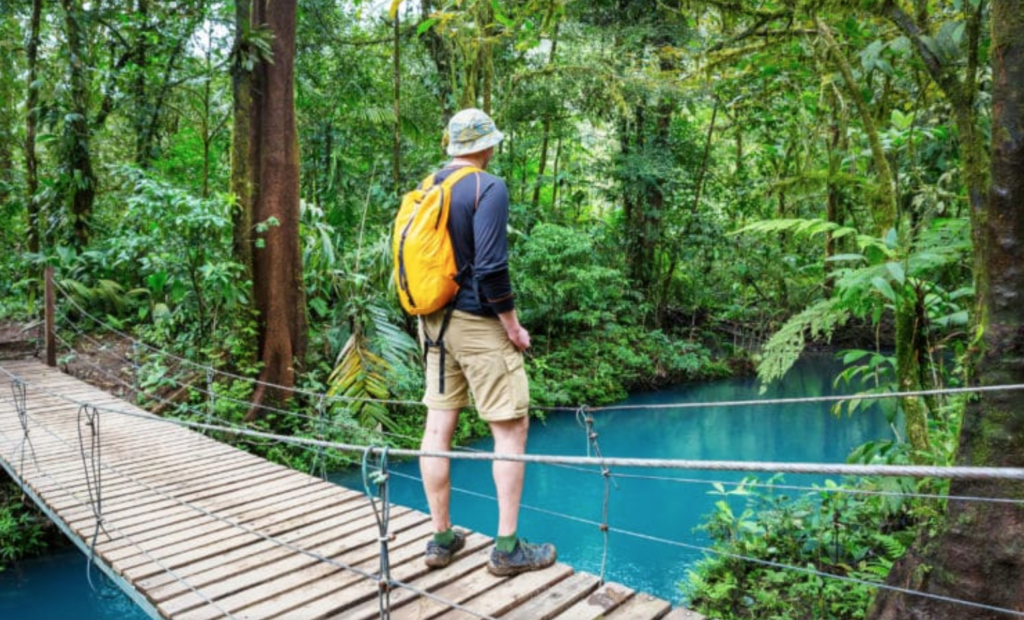
Hiking in Costa Rica. * Photo: Nick Kontis
In the bi-diverse coastal perimeters of Golfo Dulce, the “sweet gulf,” we boarded Zodiacs for a three-hour tour to Saladero, where acrobatic dolphins gave us a full display of their athleticism.
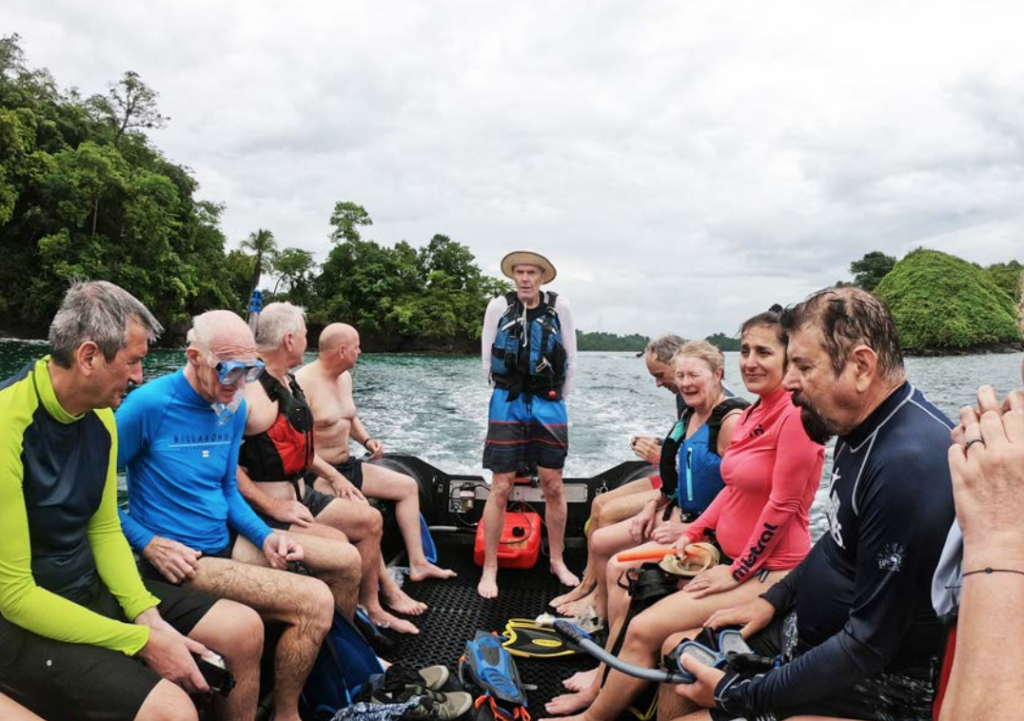
The excursion transport in Golfo Dulce. * Photo: Aurora Expeditions
Exploring Panama on our Greg Mortimer Cruise
Entering Panama, we visited one of the world’s most extensive marine reserves at Coiba National Marine Park, where our group kayaked and paddleboarded inside a tranquil bay.
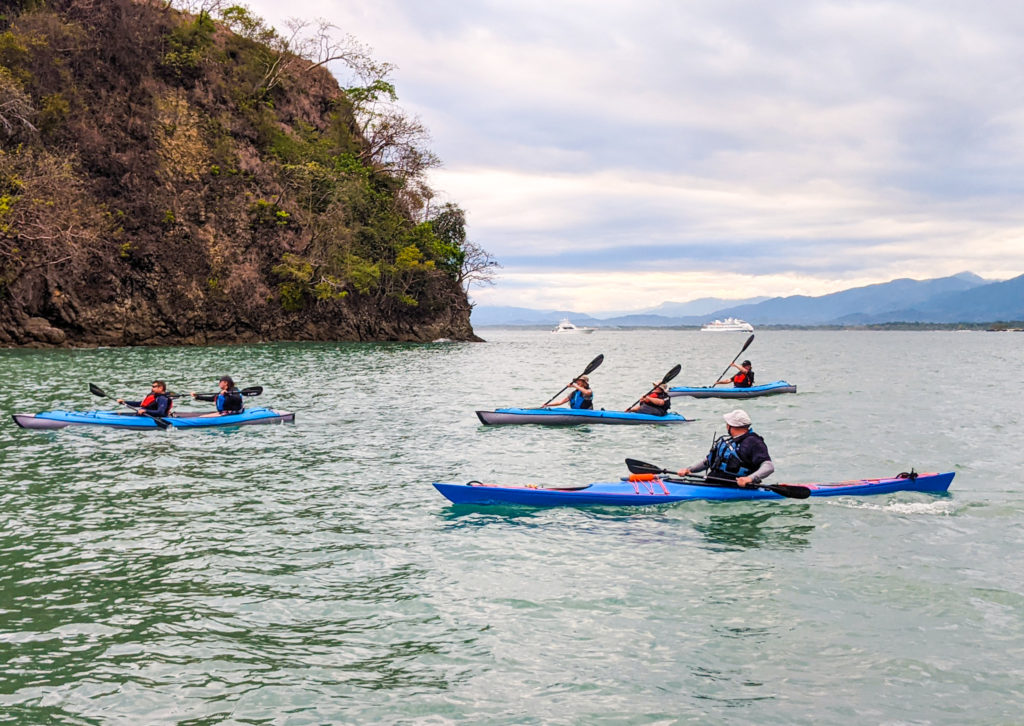
Kayaking in the bay of Coiba National Park. * Photo: Nick Kontis
My wife and I opted for a tandem kayak and ventured with our guide and a group of 10 for a thrilling tour around the bay in calm waters.
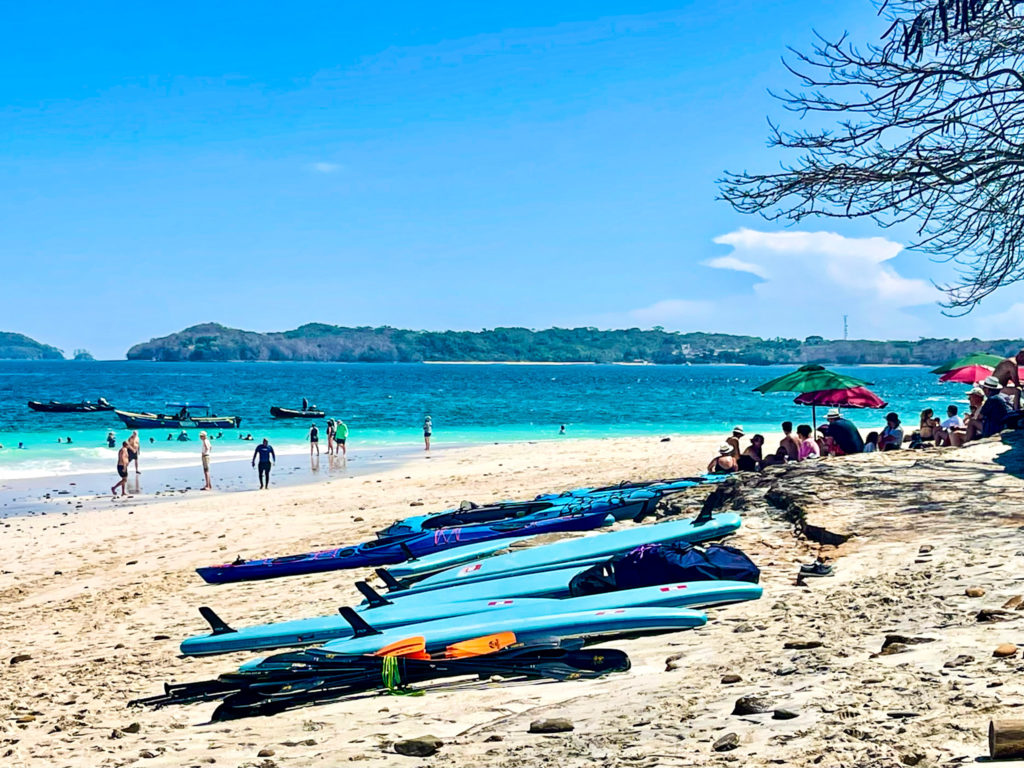
Water activities include paddle boarding and kayaking in Coiba National Park. * Photo: Nick Kontis
As we headed southeast into the coastal waters of Panama, we visited a community of indigenous Embera Indians.
The 100-or-so villagers allow visitors a glimpse into their everyday lives. I enjoyed taking a jungle walk with village elders, learning about medicinal plants used by the tribe for healing, and watching Embera women perform their traditional shamanic dance.
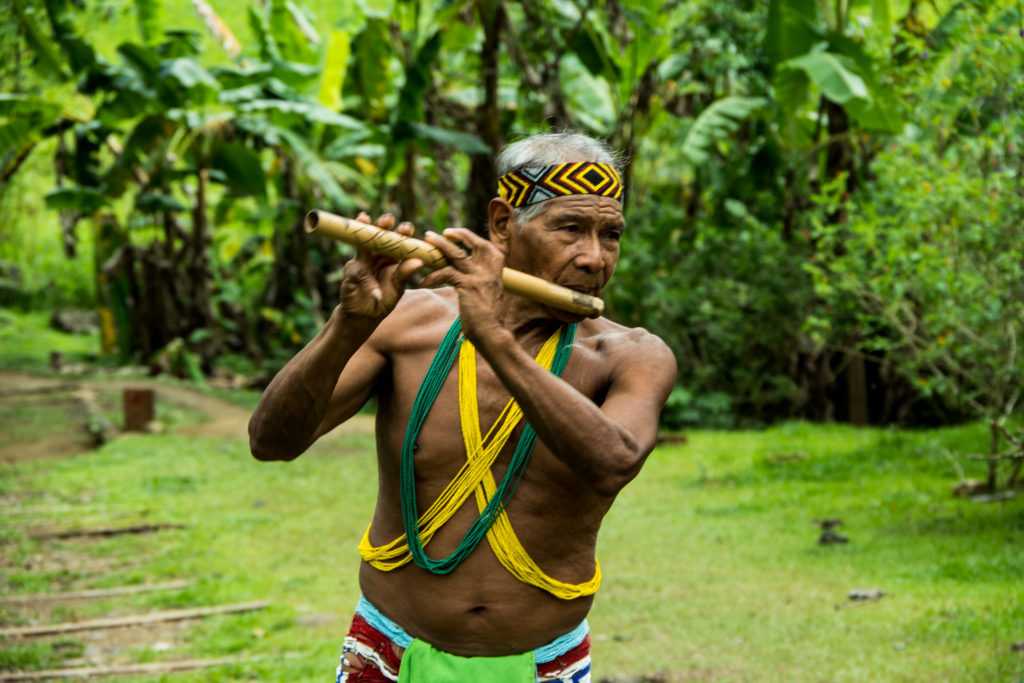
On a day trip we visited the Embera Drua Village for a glimpse into the lives of the indigenous community. * Photo: Nick Kontis
While I found this day trip to feel mostly genuine, some of my group questioned the authenticity, wondering if this experience was simply a show for tourists. They speculated that the baskets, jewelry and other trinkets for sale may have been made in China.
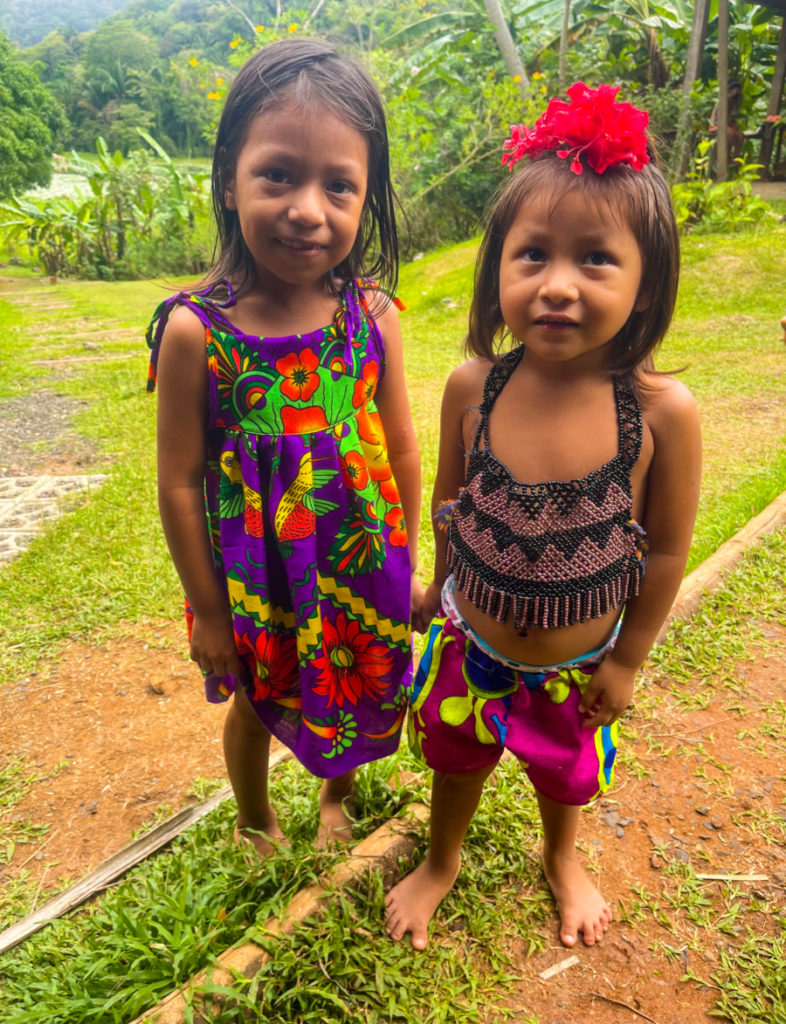
Adorable children in the Emberá village. * Photo: Nick Kontis
Transiting the Panama Canal on the Small Greg Mortimer
Panama is roughly the size of the U.S state of South Carolina and approximately one-and-a-half times the size of Costa Rica.
It is the only place in the world where you can see the sun rise on the Pacific and set in the Atlantic from the same spot.
The vibrant capital, Panama City, is the only capital city in the world with a rainforest within its limits.
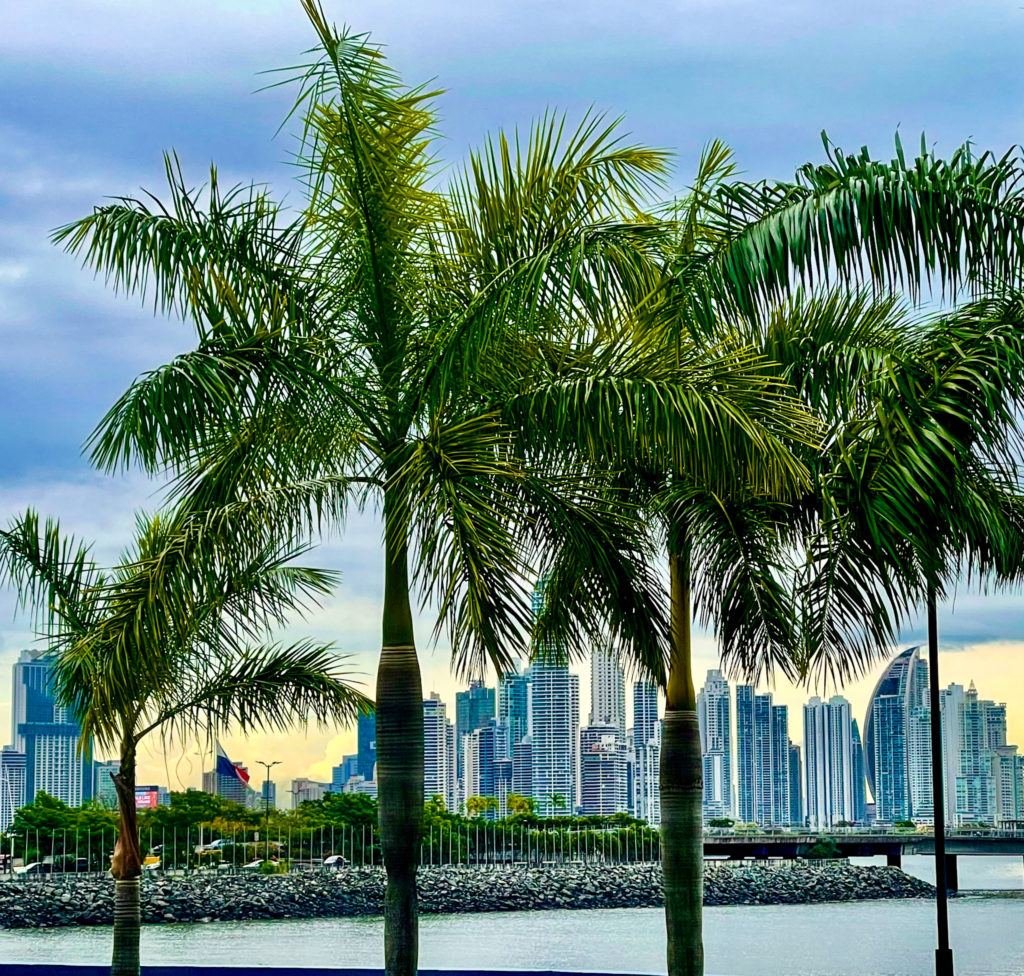
View of modern Panama City from the well-preserved Casco Viejo old town. * Photo: Nick Kontis
On a guided city tour before we transited the canal, we explored the picturesque old quarter of Casco Viejo, home to the city’s trendiest bars, restaurants and nightlife.
We strolled the cobblestone streets of the UNESCO World Heritage enclave, featuring picturesque multicolored homes, wrought-iron balconies, and churches dating back to the 1800s.
The Miraflores Locks visitor center (part of which is open) provided a glimpse into the operation and history of the Panama Canal.
I learned that Lake Gatun, located south of Panama’s second largest city of Colón, is the world’s second largest artificial lake after only Lake Mead (on the Nevada-Arizona-California border).
The visitor center was a great introduction to our daylight transit of the canal itself.
The Panama Canal — an Engineering Marvel
Extending 30 nautical miles (57 kilometers) between the Pacific Ocean and the Caribbean Sea, work on the Panama Canal began in 1880. It took 34 painstaking years later before it was completed in 1914.
During construction of the Panama Canal, more than 25,000 people died of malaria, dysentery, and yellow fever. But the passage revolutionized international trade by creating a faster way to transport goods between the world’s two largest bodies of water.
In the Pacific-to-Atlantic crossing, there are no stopovers en route.
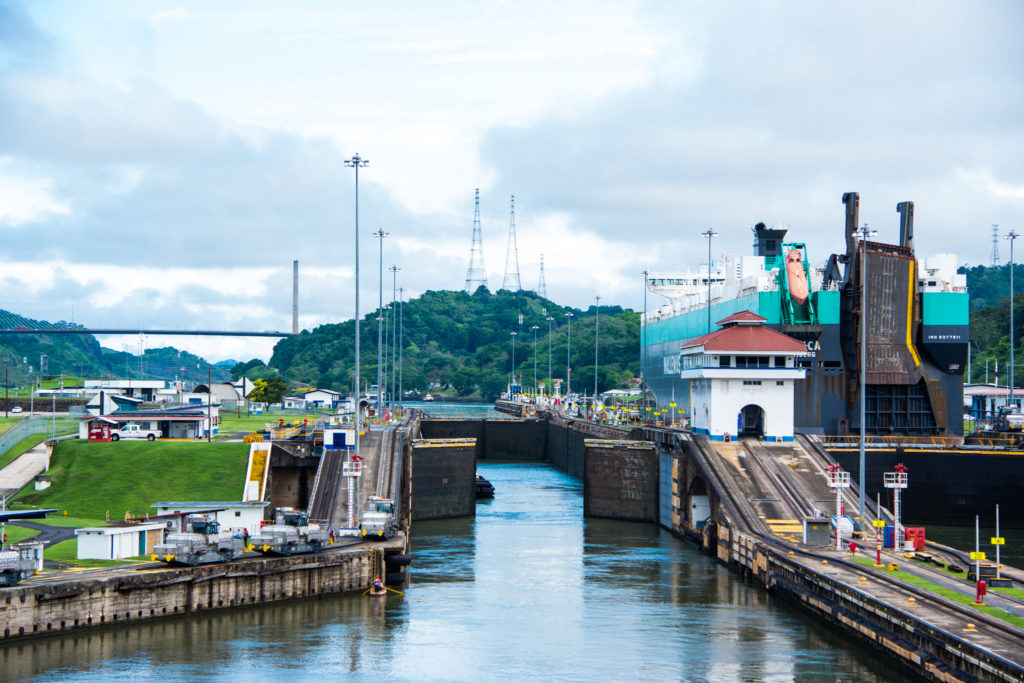
Passing through the locks of the Panama Canal is a bucket list moment. * Photo: Nick Kontis
I was excited to witness the workings of the famous channel up close, while passing through the locks and waterways of Balboa, Miraflores, Pedro Miguel, Culebra Cut, the Chagres River, Lake Gatun, Gatun Locks, and Limon Bay at Colón.
Surprisingly, passing through the narrow locks was not claustrophobic even though we were aboard a relatively small ship that was dwarfed in comparison to the massive chambers.
VIDEO: Below is a time-lapse of part of the Panama Canal transit.
Huge container ships mainly cross at night, unlike cruise ships, which travel in the early daylight hours. Nonetheless, they were impressive to view from afar.
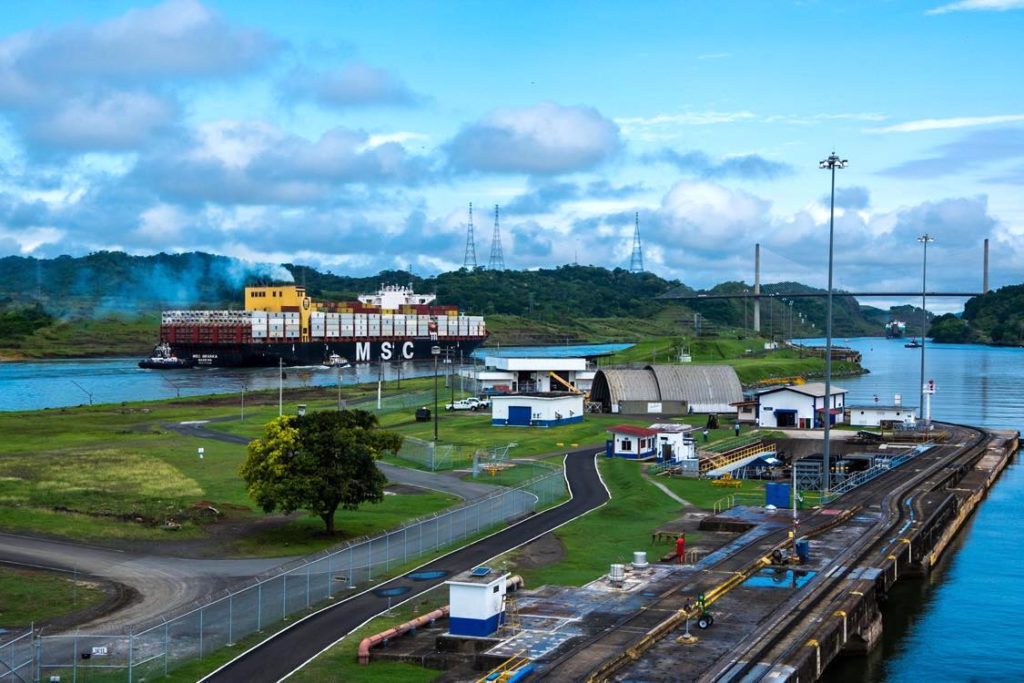
A container ship in the Panama Canal at dusk. * Photo: Nick Kontis
Ending our Greg Mortimer Cruise Expedition in Cartagena, Colombia
The cruise ended in Cartagena de Indias, on Colombia’s sun-splashed Caribbean coast.
Some guests departed for the airport after a guided tour of the city, but most remained for one last complimentary night at the Hilton Cartagena, an outstanding beachfront property with four outdoor pools.
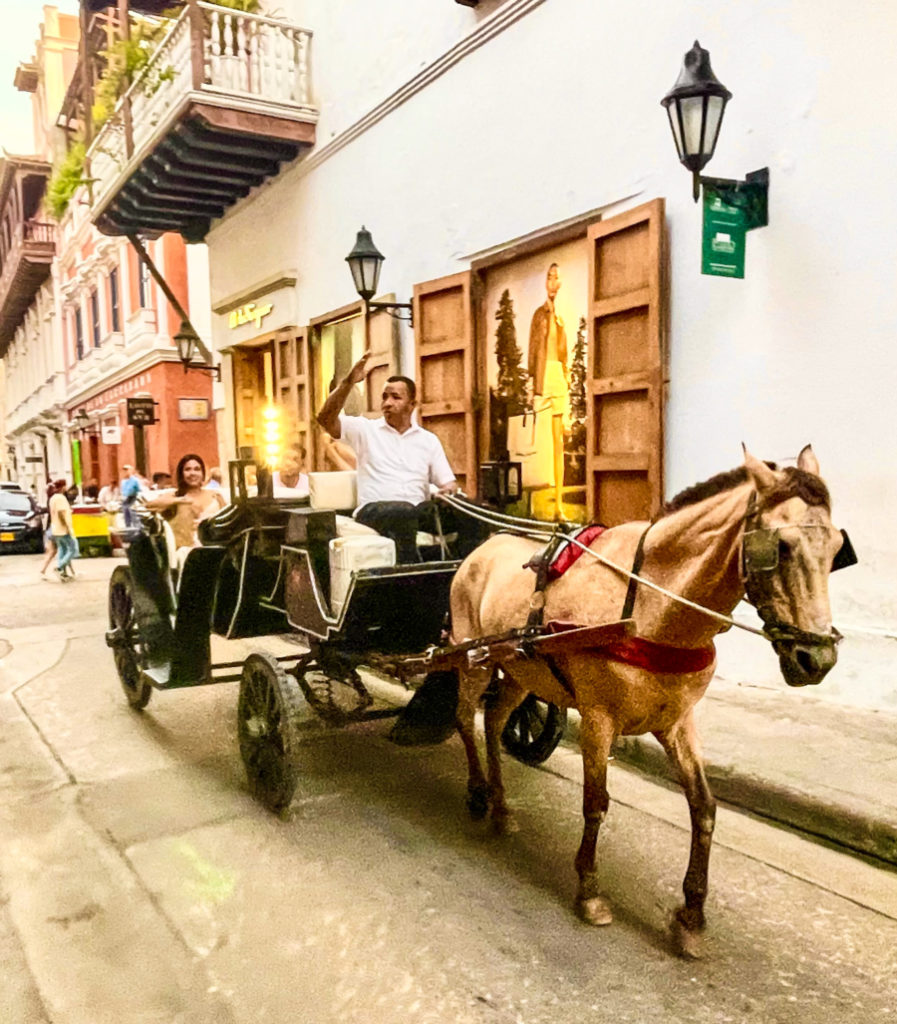
The cruise ends with a 3-hour tour and lunch in Afro-Caribbean Cartagena de Indias. * Photo: Nick Kontis
The historic Caribbean port city cradles nearly 500 years of colonial charm. A kaleidoscope of vividly painted buildings stand within the walls of its old town.
Adjacent lies the lively-hip Getsemani barrio, its street-art murals showcasing daily life. Here, you’ll find street musicians playing until the early morning hours.
Cartagena’s atmosphere is intoxicating, making an early exit almost unfathomable. My wife and I stayed at the Casa de Alba boutique hotel in the beautiful walled citadel, built in the 16th century, for an extra five days.
Then, we extended our trip with another five days in mountainous Medellin, Colombia’s second largest city. (A one-way ticket on Avianca, the national airline, was only US $40 from Cartagena.)
Top attractions here include the Comuna 13 barrio, once a notoriously dangerous neighborhood, now transformed into a thriving tourist area with striking street art.
Native-son artist Fernando Botero has donated massive sculptures for outdoor display in the aptly named Plaza Botero.
The colonial town of Guatape, a two-hour bus ride away, is considered another must-visit attraction.
We Loved the Crew & Passengers on our Greg Mortimer Cruise
Ultimately, it was the people I met who created the most lasting memories of our Greg Mortimer cruise in Costa Rica and Panama.
In particular, the international team of guides and naturalists aboard the Greg Mortimer made it unforgettable.
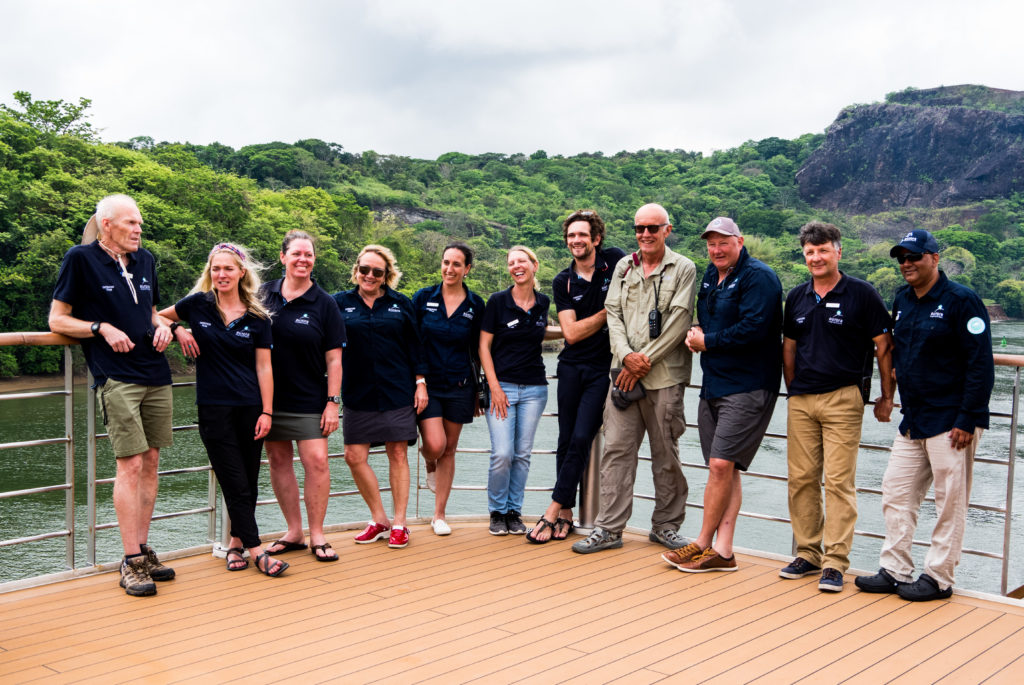
The expedition team boasts a variety of backgrounds, experiences, and expertise. * Photo: Nick Kontis
Costa Rican Conrad Weston is a photographer and naturalist. His knowledge of bird species is nothing short of remarkable. On jungle hikes in Manuel Antonio and Corcovado, Conrad pointed out birds in trees, including the orange-bellied trogon, that the average eye would never find.
British biologist and destination expert Phoebe Edge was always accessible. No question was a burden.
“The sea has a way of enchanting us, capturing our imagination and intriguing us with mysteries of the unexplored, so embrace every moment,” the knowledgeable naturalist reminded us.
A highlight for us was making new friends with Helen Iatrou and Carlo Raciti, fellow Greeks from Athens. Helen is a travel writer, Carlo a photographer. We hit it off right away and were inseparable.
As for the staff, Austrian hotel director Franz Wusits and his team were a joy to be around, as were the rest of the 56 crew and 18 additional staff.
Dining on the Greg Mortimer
A Jamaican chef and Peruvian food-and-beverage manager oversaw three meals a day, and special needs were easily answered — including my wife’s request for gluten-free, dairy-free meals.
Due to COVID restrictions, there were no buffet meals in the main restaurant on Deck 5 . Breakfast options included steel-cut oatmeal, morning pastries, seasonal fruit, smoked fish, Belgian waffles, avocado toast, omelets, and eggs made to order.
For lunch, some of the tasty main courses included marinated center-cut grilled pork chop and shrimp quesadillas.
The chef served an international menu with one consistency; there was always an Indian dish, mostly vegetarian, on the dinner menu.
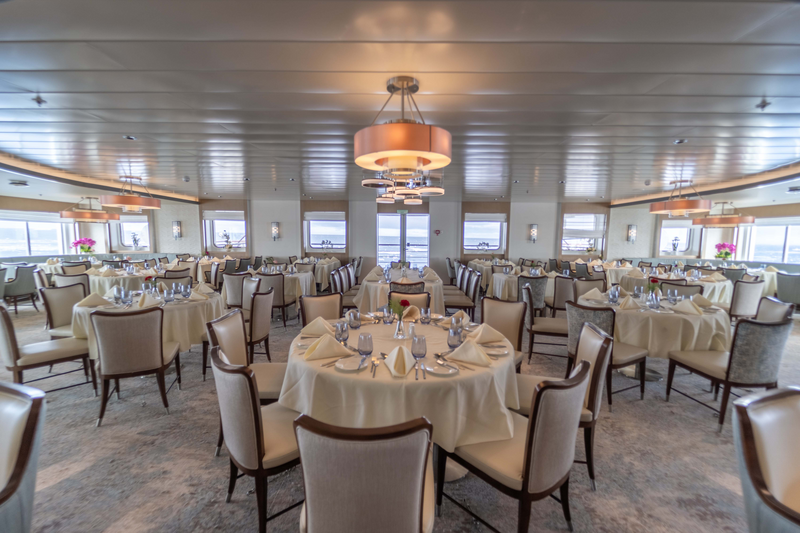
Greg Mortimer's main restaurant. * Photo: Aurora Expeditions
Highlights included my favorites New Zealand lamb chops, braised veal shank, chicken cordon bleu, seared tuna with shichimi togarashi, and spinach cannelloni.
Always available for lunch or dinner were New York steak, grilled chicken breast, broiled Atlantic Salmon, Caesar salad, French fries, and truffle fries.
There was also an outdoor barbeque on the top deck.
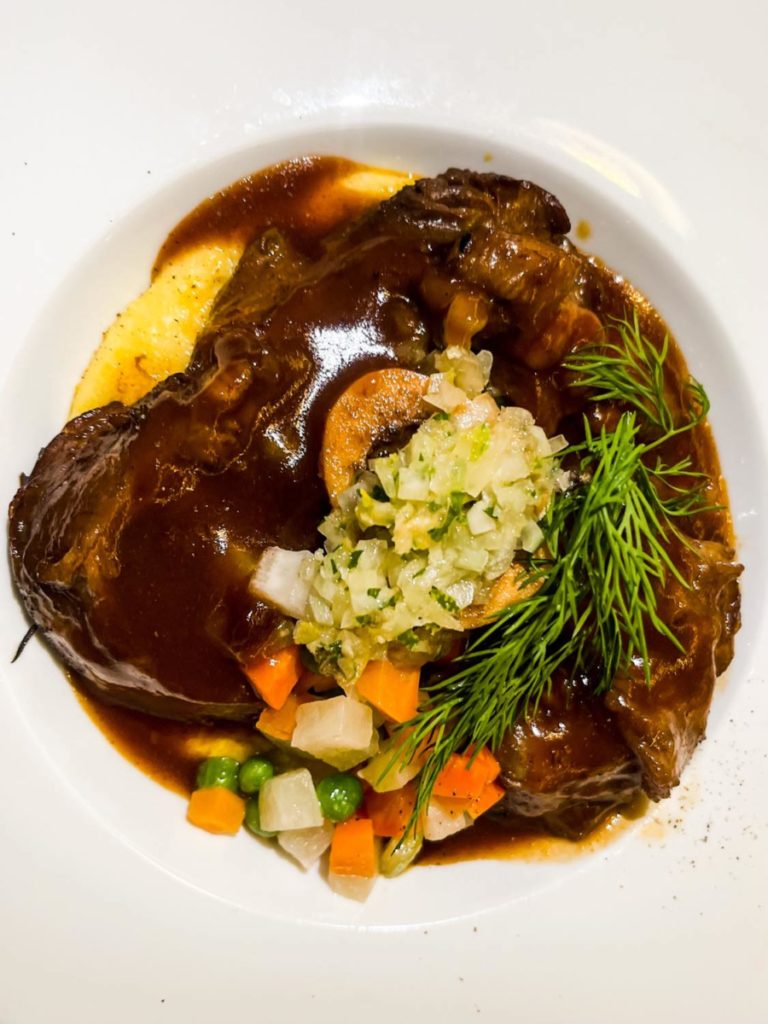
Braised Veal Shank Osso Buco with potato & carrots Mousseline. * Photo: Nick Kontis
A Typical Day aboard Greg Mortimer
Our typical jam-packed expedition days began with breakfast served from 7–8 am, and then a group meeting in the lecture rooms.
Between 9-10 am, daily excursions departed from the mud room; we boarded zodiacs, returning around 1130 for lunch, which was always served between 12:00-12:30.
Then, after a short downtime, it’s time to leave between 1-2 pm for a second-afternoon outing returning between 4-5pm with an afternoon recap in the lecture theater, including a reminder of the next day's activities.
At 6 pm, happy hour takes place at the Elephant Island Bar with cocktails and canapes. Cozy lounge seating designed for mingling with fellow passengers was well-spaced for greater social distancing.
The dining room serves an ala carte three-course dinner with complimentary wine and beer at 7 or 7:30 pm.
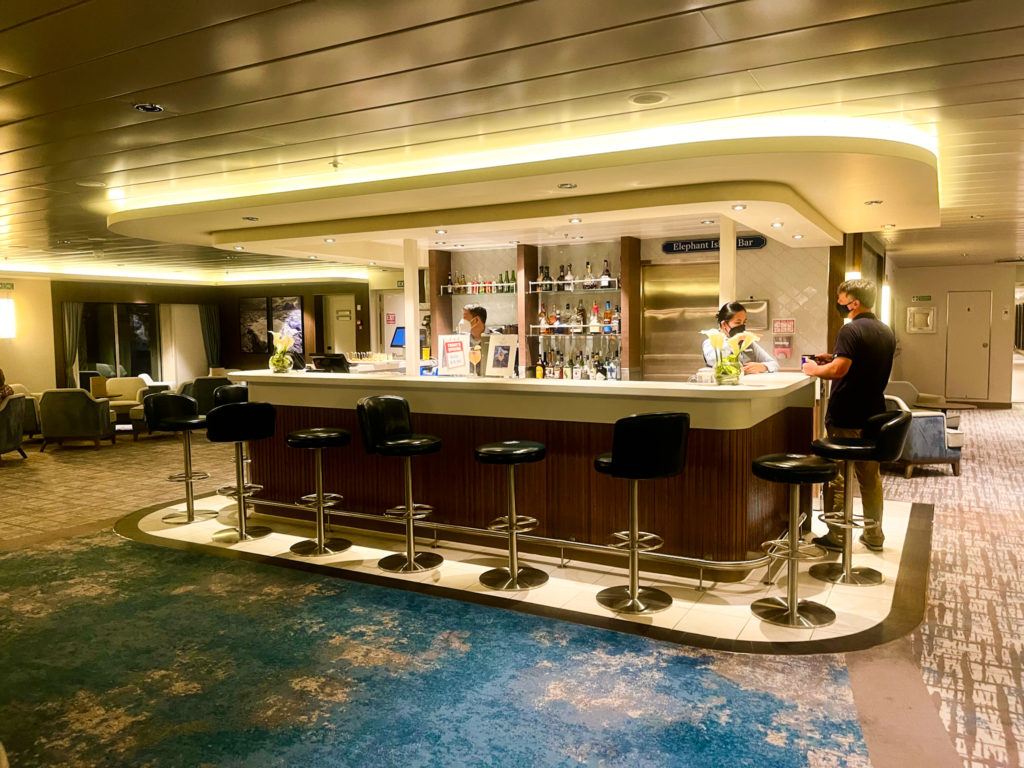
The Elephant Bar. * Photo: Nick Kontis
Tips for Cruising on the Greg Mortimer
- A recurring theme on this expedition, and any such journey in the sun, is to stay hydrated. Aurora gives each guest a water bottle and filling stations are available on each deck.
- I was reminded to bring sunscreen, mosquito repellent, a raincoat, a change of footwear for wet landings, and binoculars to capture the unexpected at a distance.
- Don’t expect much downtime. Don’t miss anything. Go with the company’s motto of “go with the flow and remain flexible.”
- Spend as little time as possible in your room. Don’t miss the chance to see dancing dolphins or breaching whales from the observation decks because you were in your room.
- You’re up early each day for breakfast at 7am. Morning excursions begin at 8 or 9am. Return for lunch and head back out for afternoon exploration, then come back to the ship for eye-popping sunsets and dinner. Days go by fast and are jam-packed.
- Although shipboard dress is informal, passengers might consider bringing cocktail attire for the once-per-cruise Captain’s Welcome meet-and-greet cocktail gathering at the Elephant Bar, which is followed by a three-course dinner.
- Aurora Expeditions requires all embarking guests to be fully vaccinated (including boosters) against COVID-19. You’ll need to show proof of your negative test. There are many testing facilities in San José, with costs ranging from $40 to $120. Shipboard tests are also conducted before entering Panama and Colombia.
- Sadly, one couple from Sydney, who tested negative upon departing Australia, tested positive after arriving in Costa Rica and were not allowed to join the expedition.
Getting There
American Airlines, Air Canada, Alaska, Delta, JetBlue, Spirit Airlines and Southwest fly nonstop to Costa Rica's capital of San José from US and Canadian hubs.
Some Australian guests traveled with Qantas-American Airlines and One World (global airline association) partners from Sydney to Dallas to San José.
Interested in a Greg Mortimer Cruise?
In April 2023, sister ship Sylvia Earle is doing a 12-night Costa Rica and Panama Canal cruise (including two hotel nights) starting at $12,150 USD per person double occupancy, if booked by Jan 31, 2023.
And then in April 2024, Greg Mortimer will offer the 12-night Costa Rica and Panama Canal expedition cruise (including two hotel nights) starting at $11,036 USD per person double occupancy, if booked by Jan 31, 2023.
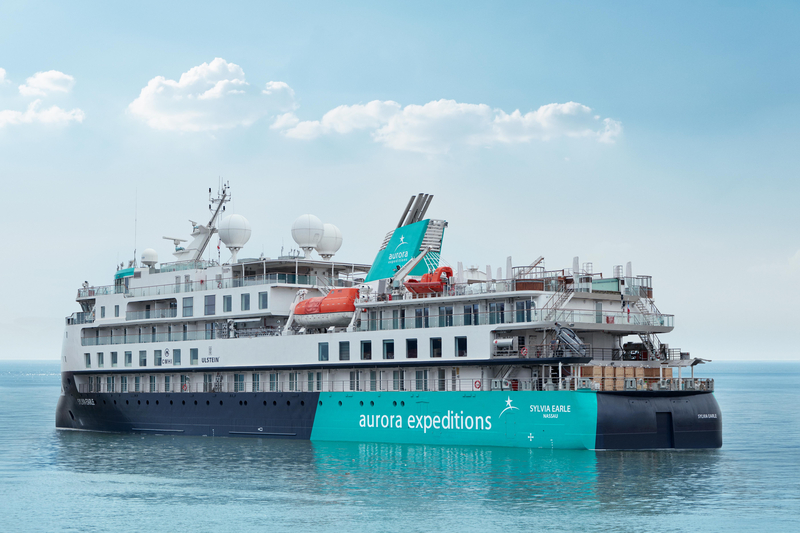
The brand new Sylvia Earle has 71 cabins. * Photo: Benjamin Tan and Masano Kawana for Aurora Expeditions
What’s Included on a Greg Mortimer Cruise
- All excursions
- Beer and wine at dinner
- Transfers
- One hotel night in San Jose
- One hotel night in Cartagena
*Gratuities are not included
Conclusion
I highly recommend this reasonably priced Greg Mortimer Cruise Costa Rica-Panama Canal expedition.
An expedition cruise is all about the journey — the experiences and encounters. And the Greg Mortimer delivered.
Designed for active expeditions mostly in the polar regions, Greg Mortimer also manages to be a very comfortable and intimate ship.
My number one piece of advice when embarking on an expedition sailing is to be flexible. Itineraries can be altered as a result of weather, rough seas, or other unseen events, such as park closures due to maximum capacity.
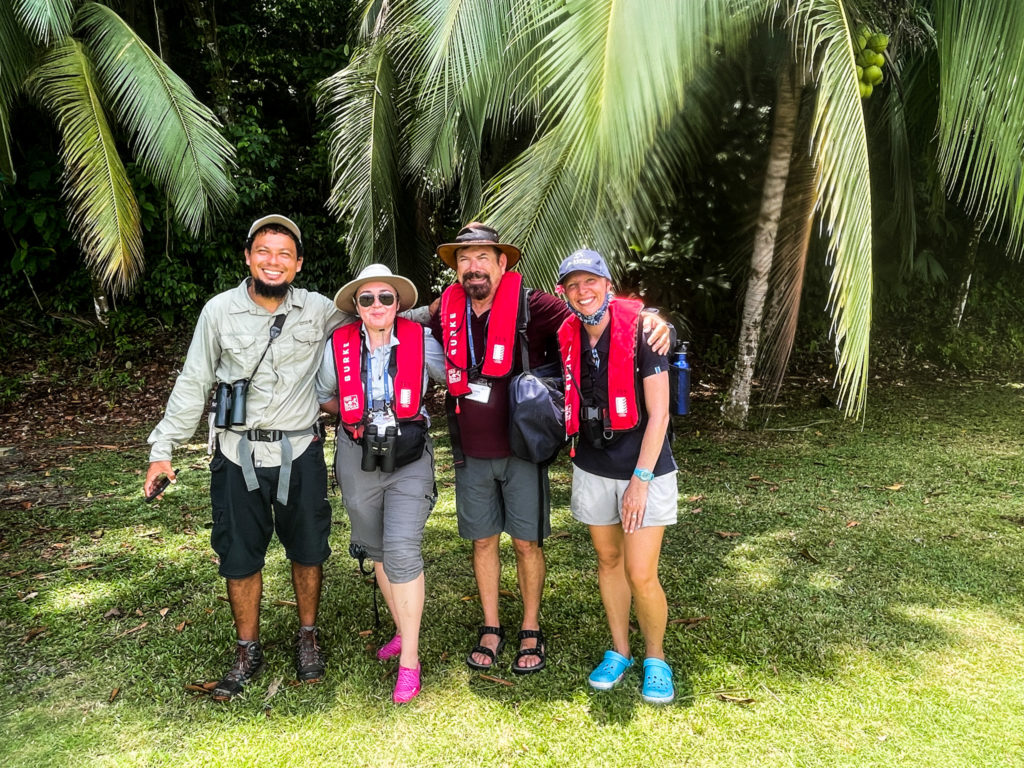
The author, second from right, with new friends met on board. * Photo: Nick Kontis
![]()
Don’t miss a post about small-ship cruising, subscribe to QuirkyCruise.com for monthly updates & special offers!
© This article is protected by copyright, no part may be reproduced by any process without written permission from the author. All Rights Reserved. QuirkyCruise.com.

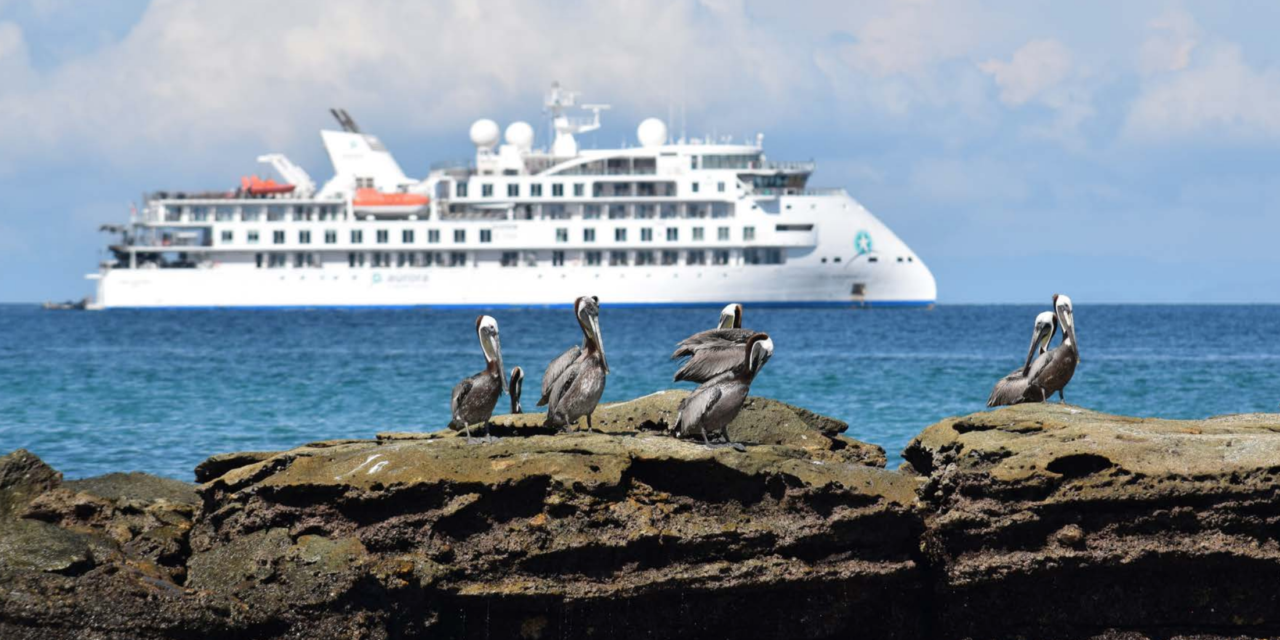
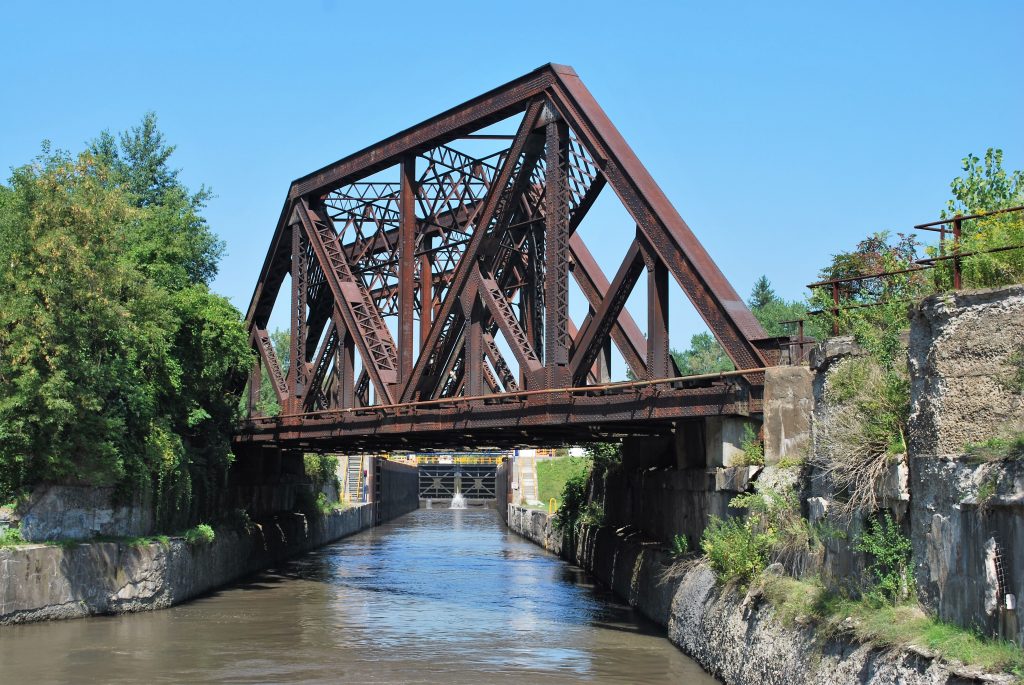
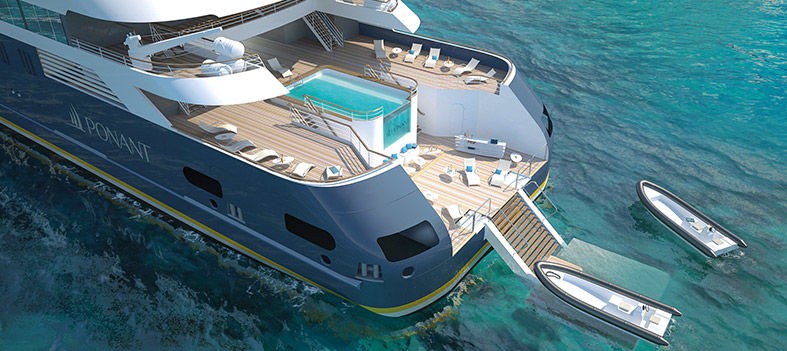

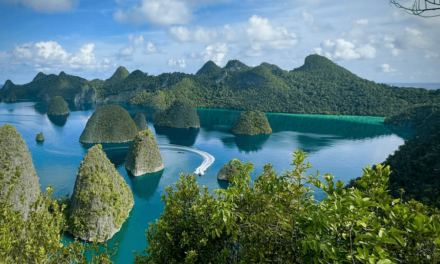
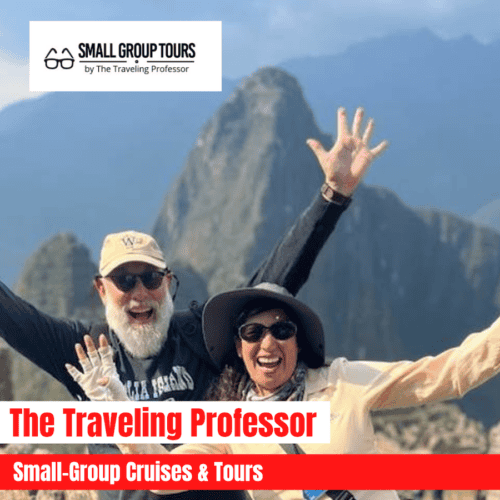
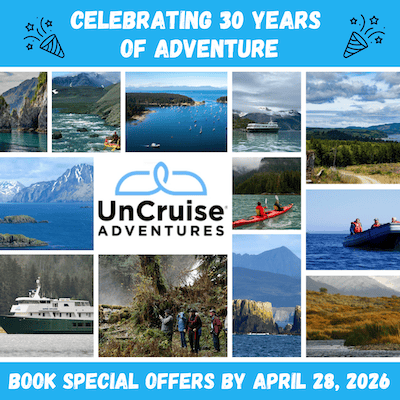
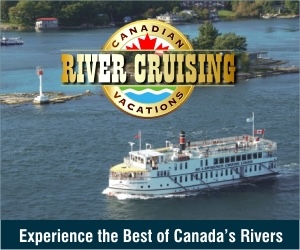

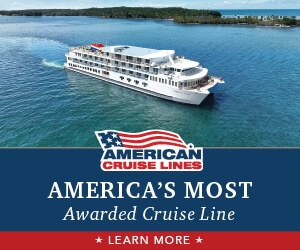
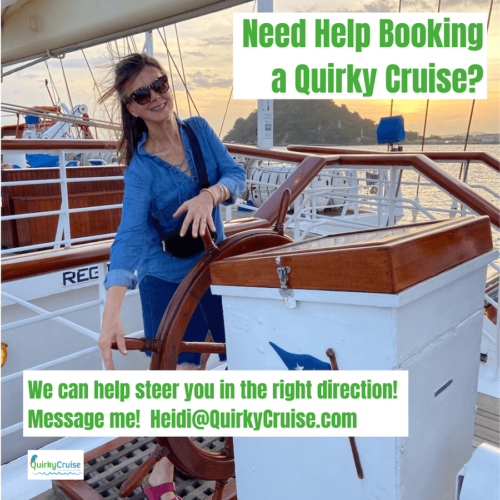
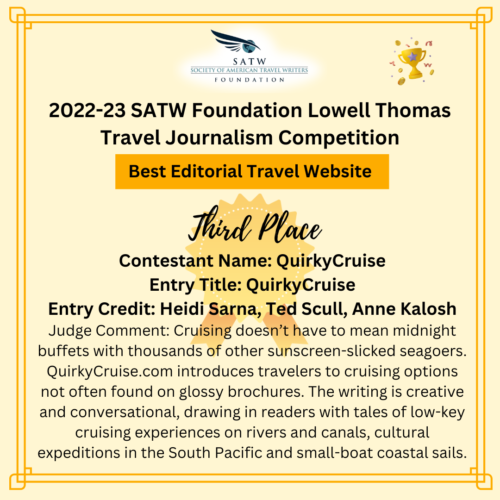


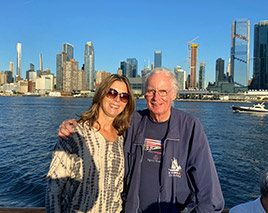 HEIDI SARNA
HEIDI SARNA
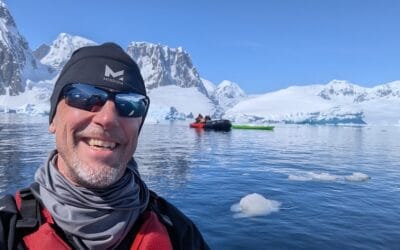

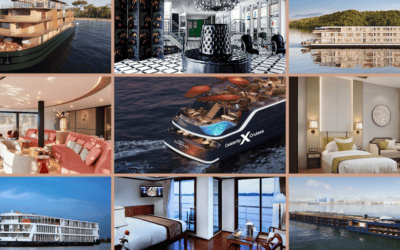
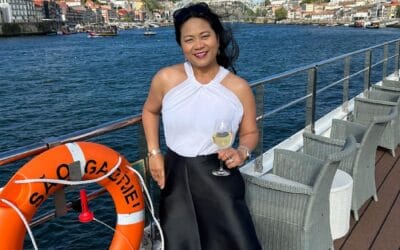
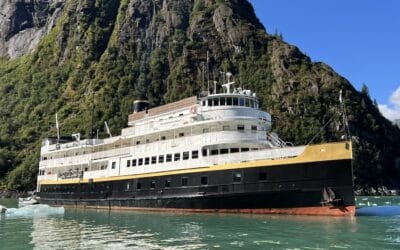
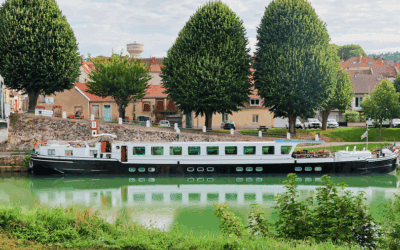
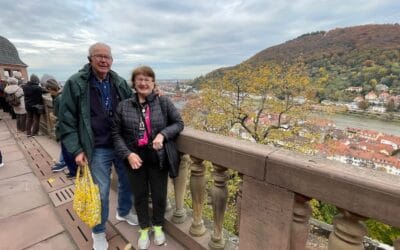
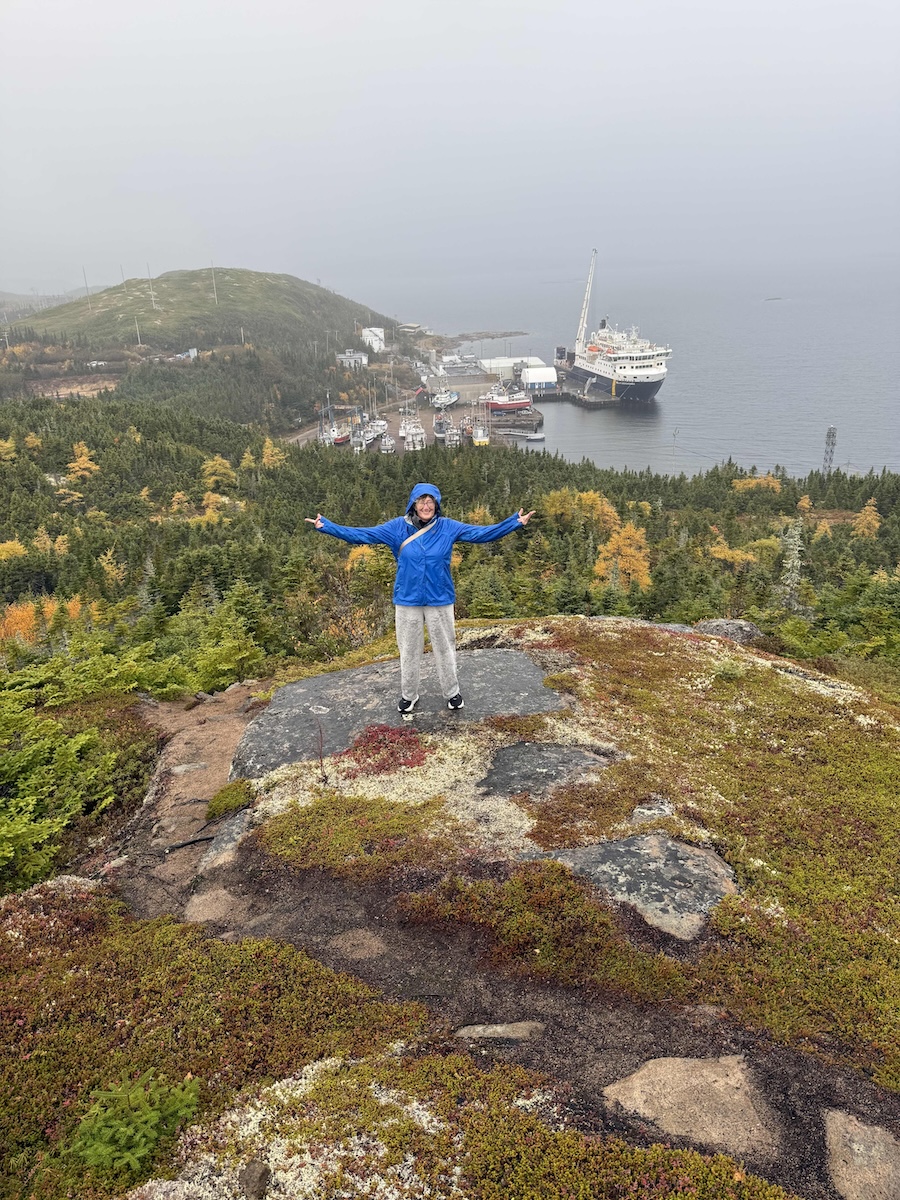
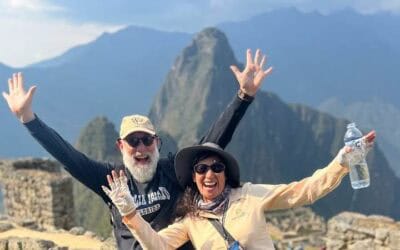
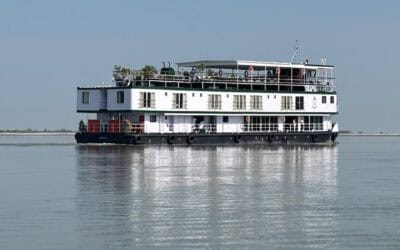
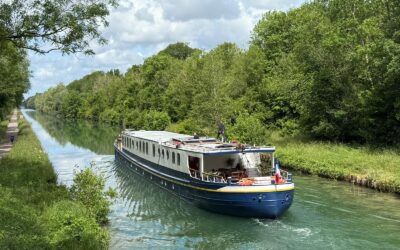

Wonderful, thorough review of the Greg Mortimer cruise in Costa Rica. Kontis’ article leaves few questions unanswered and makes the journey very inviting.
‘
So glad you enjoyed it! Here’s to small-ship cruising!
Thank you for this! I have been looking for a detailed account of a Greg Mortimer expedition and this is by far the best account out there. Very very helpful. Thank you!!!